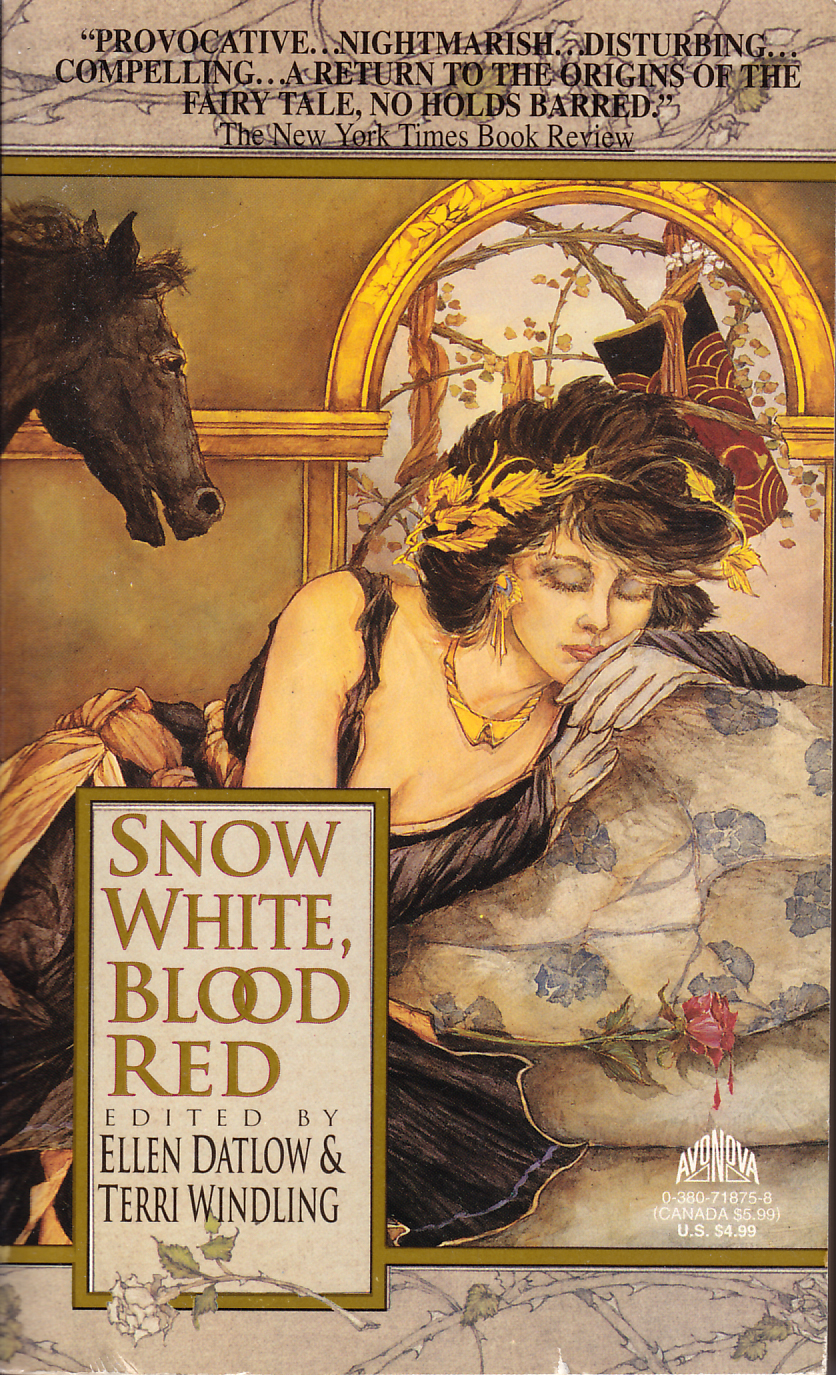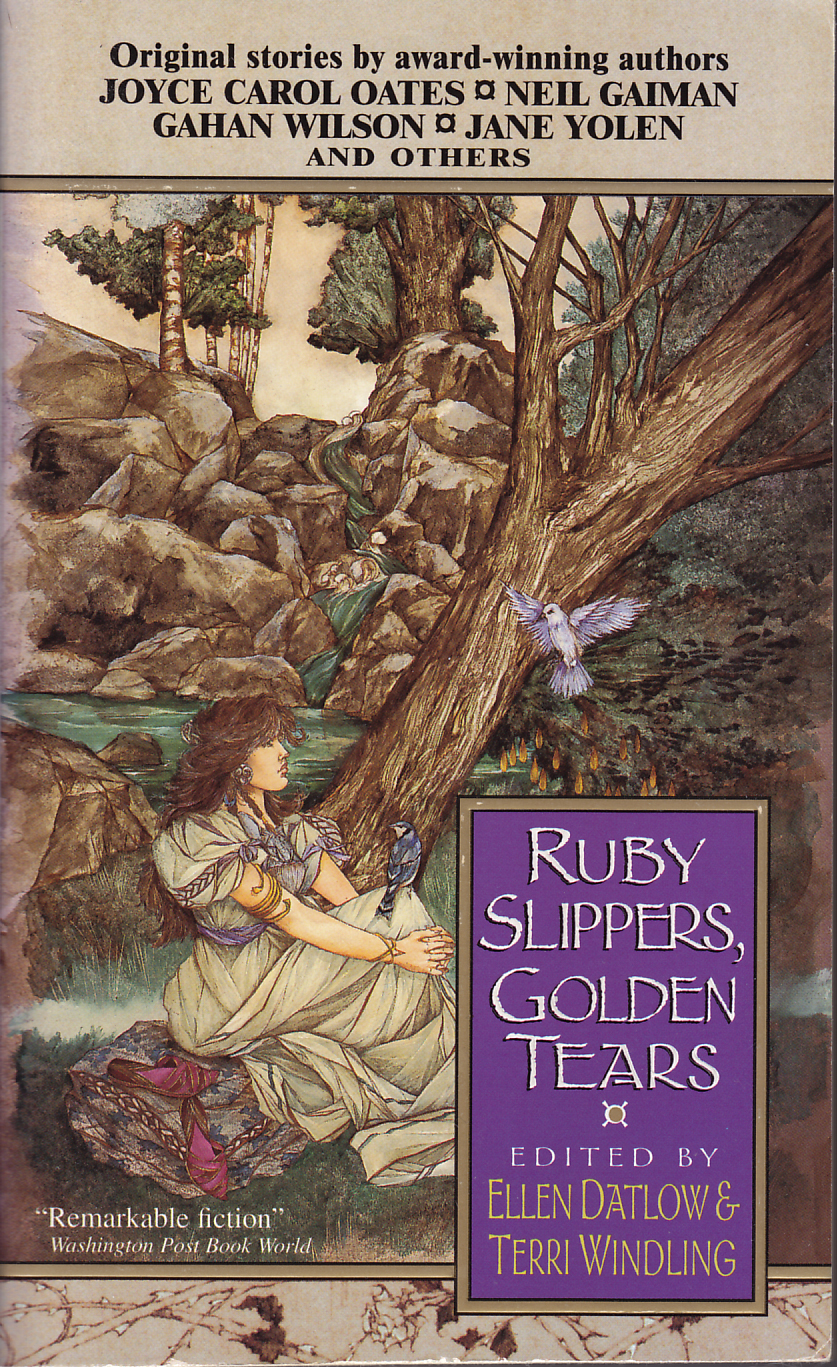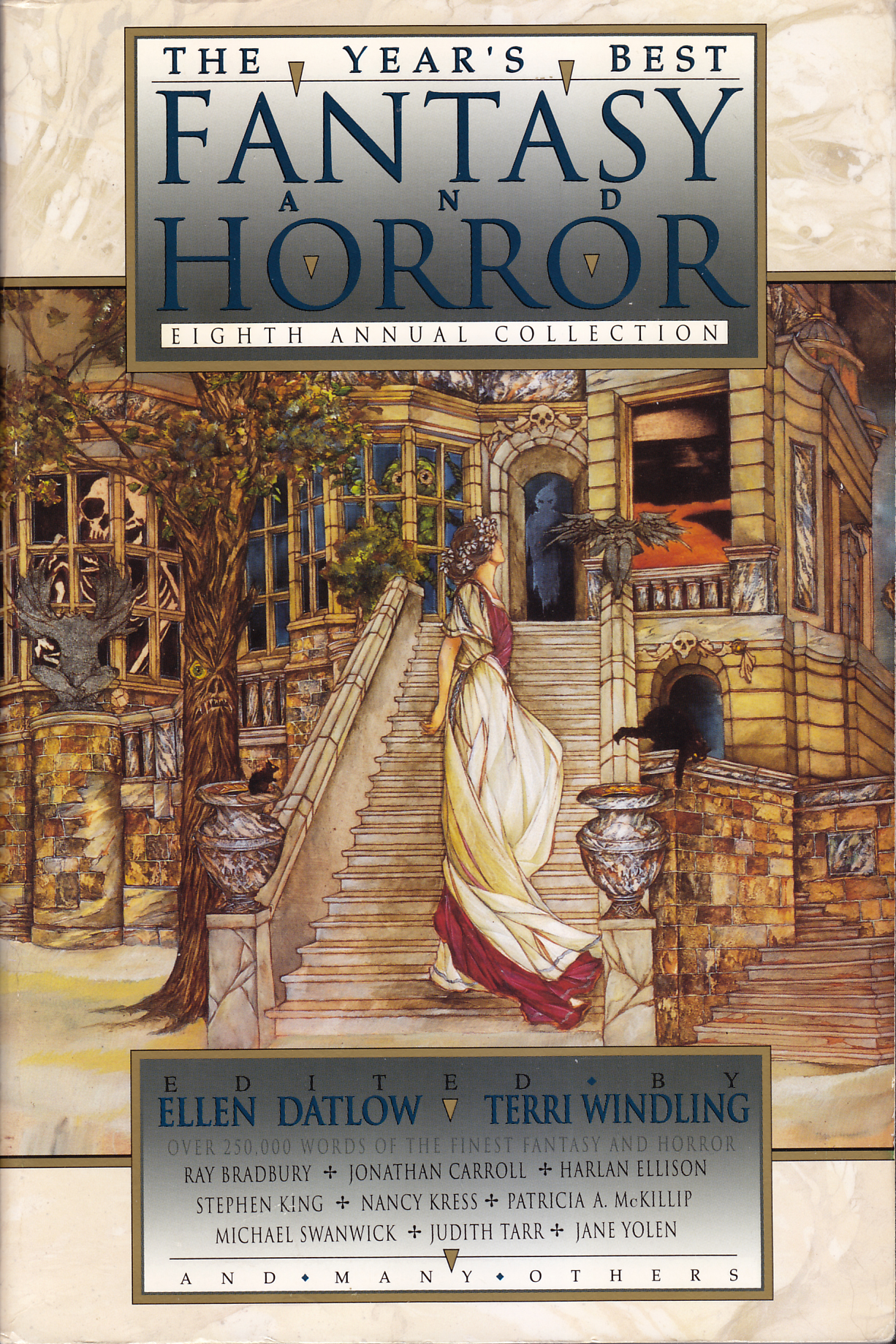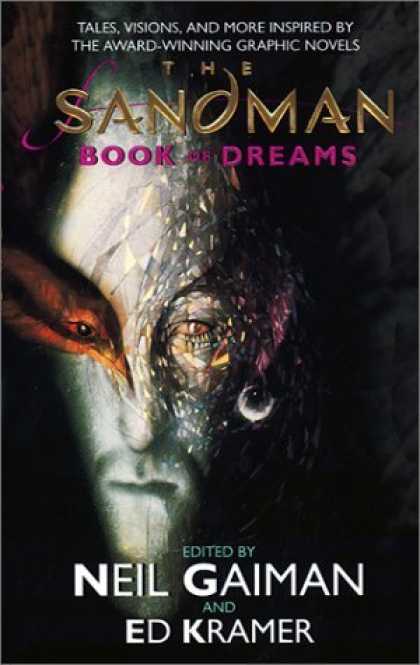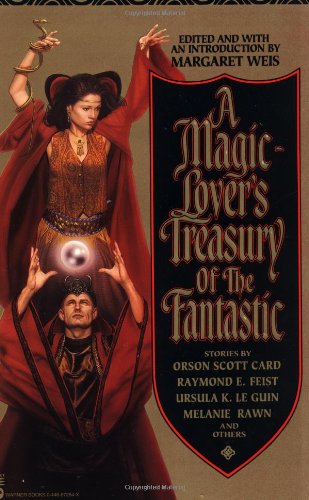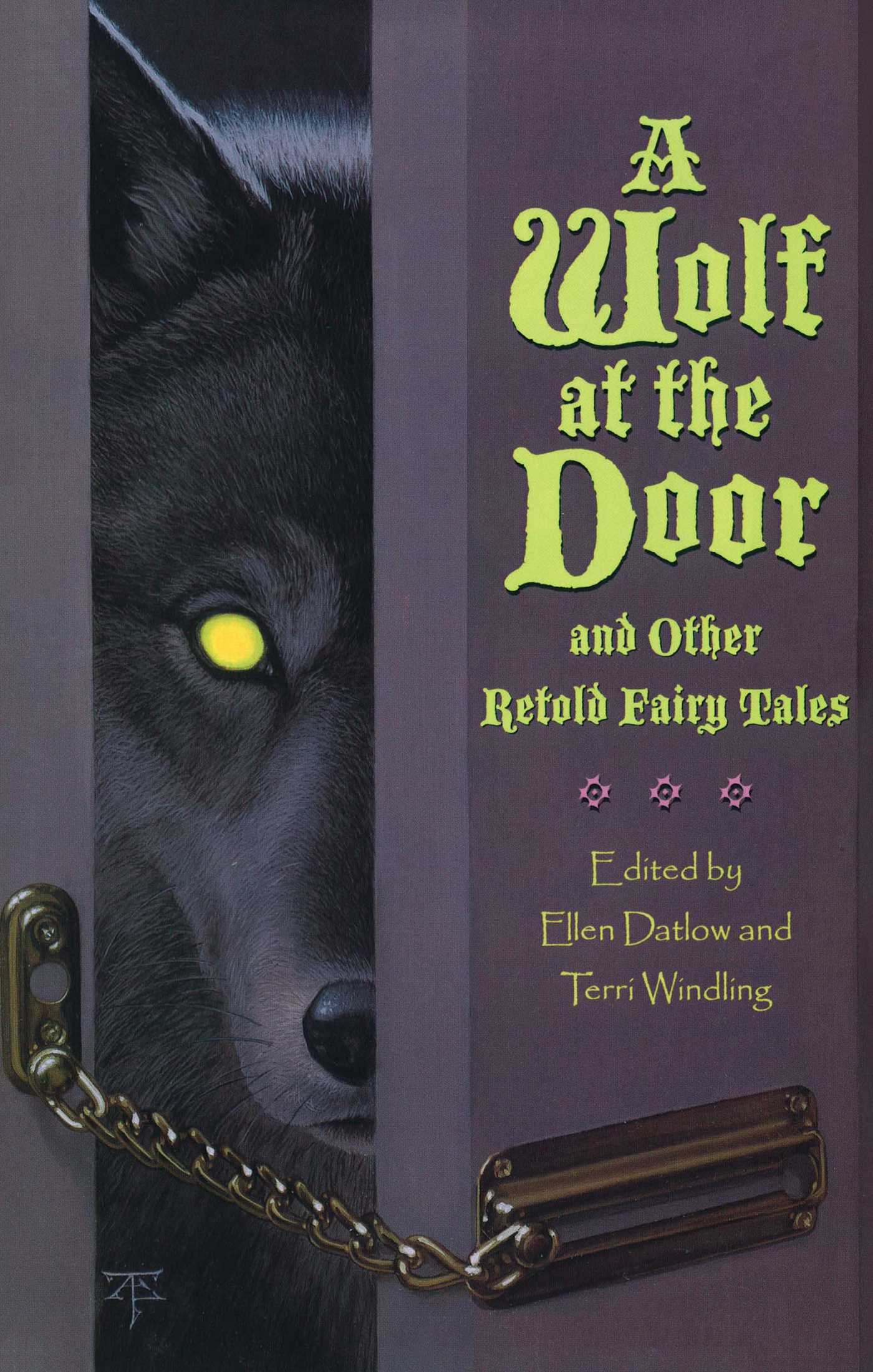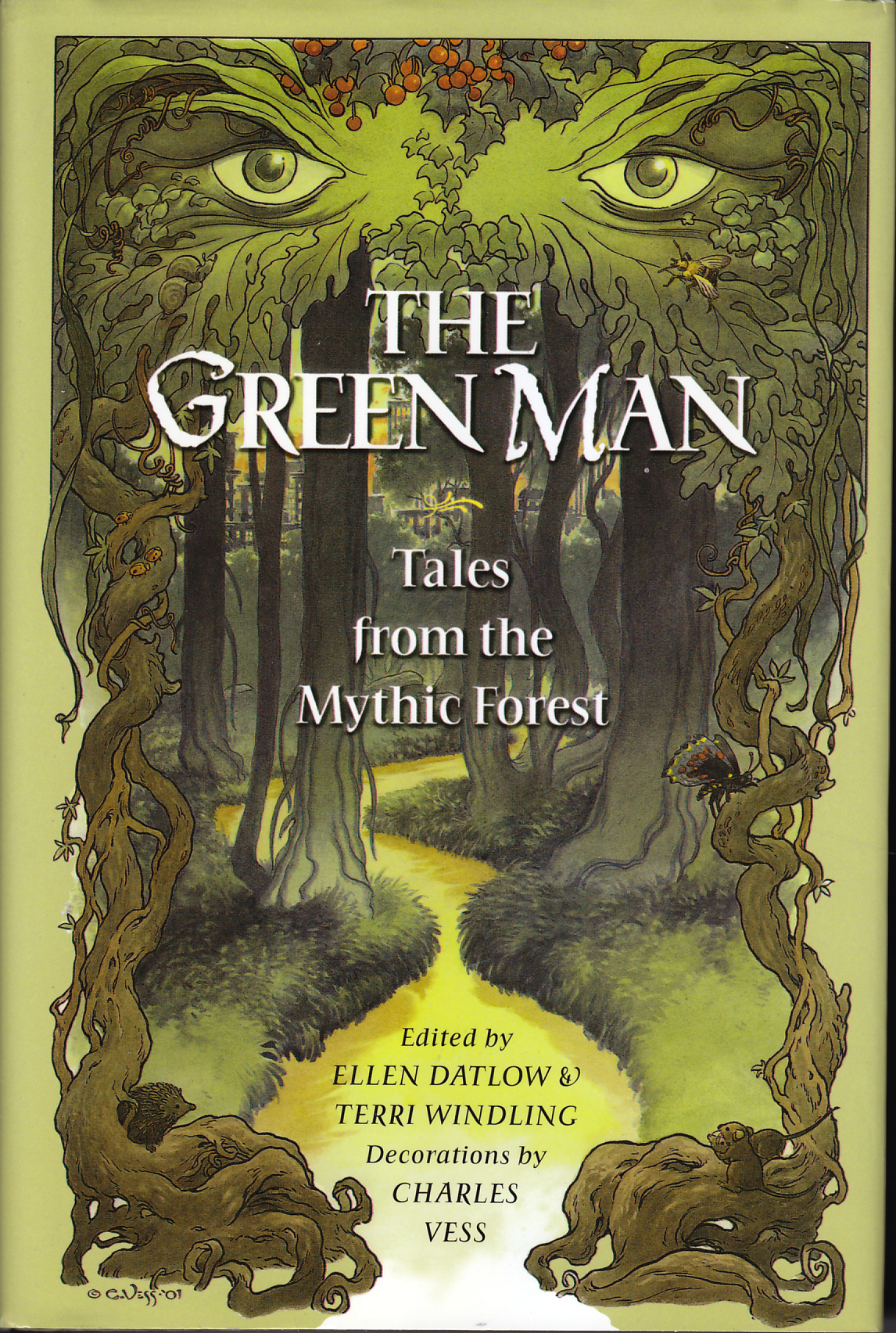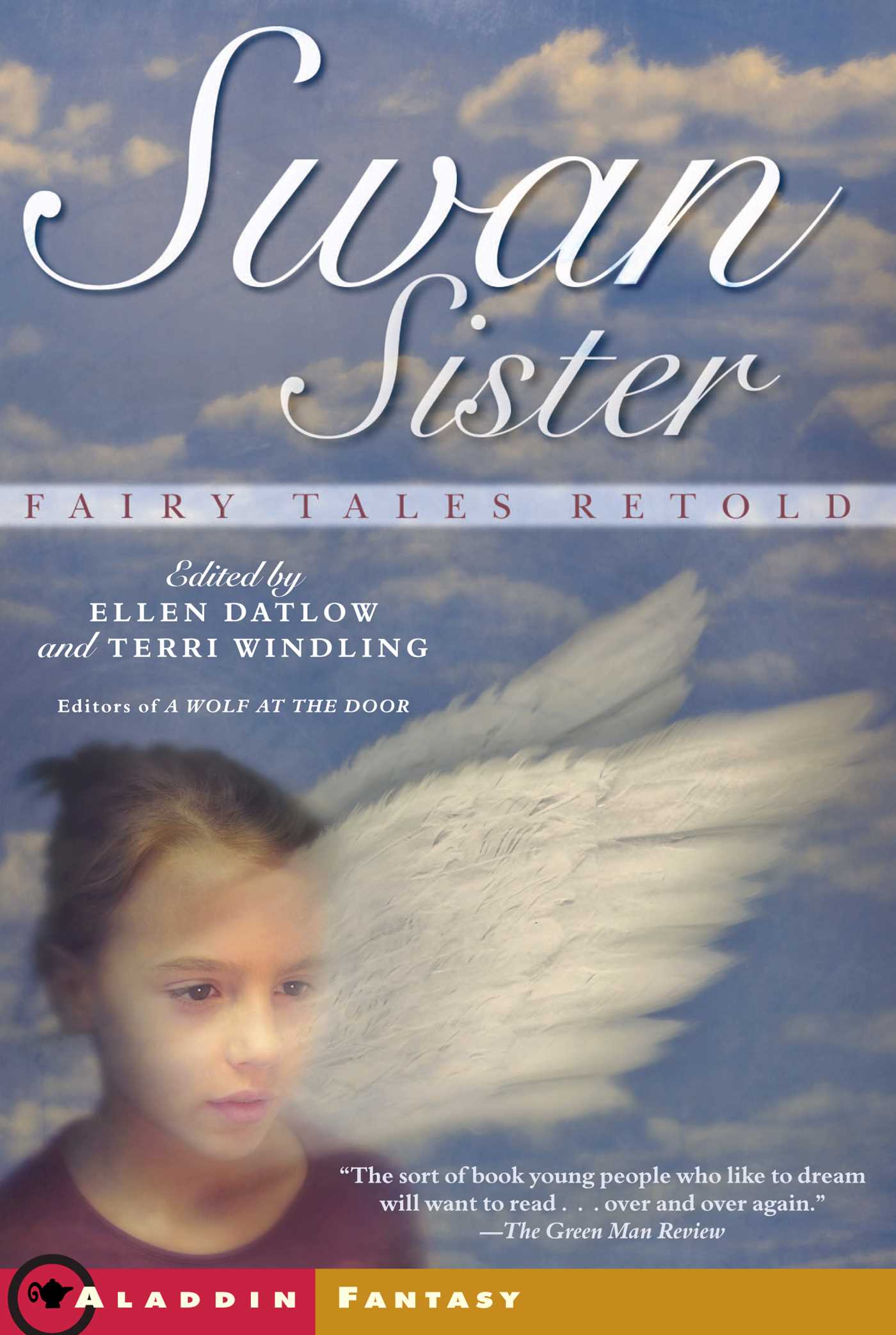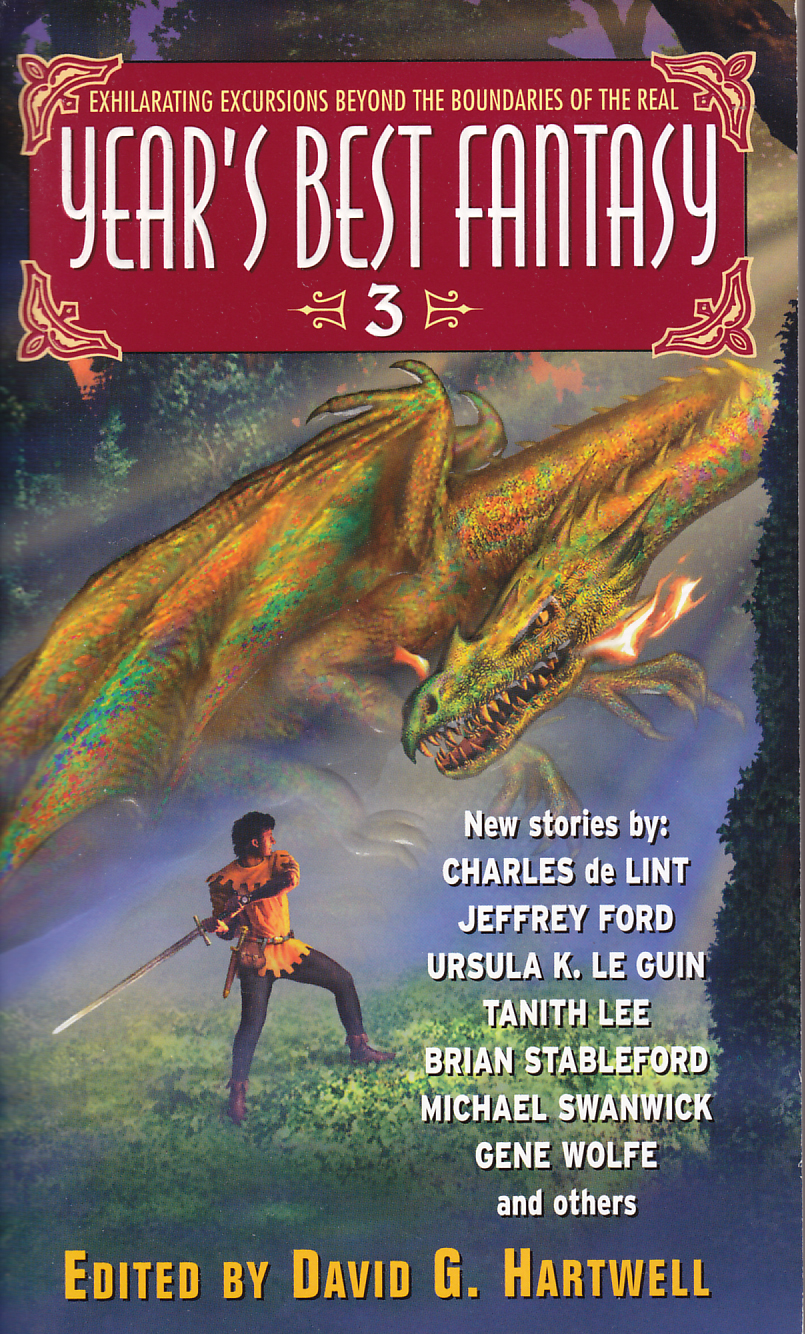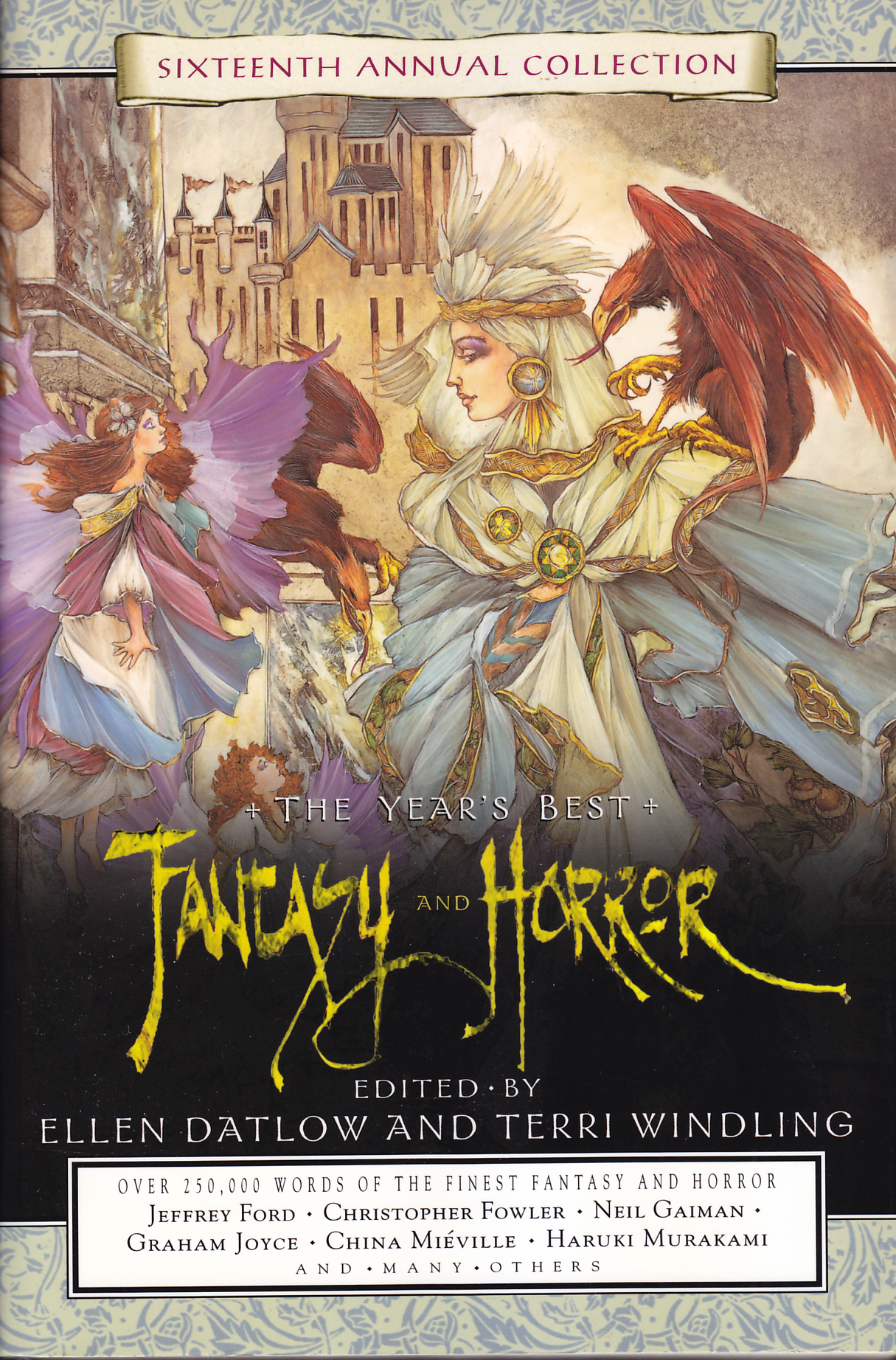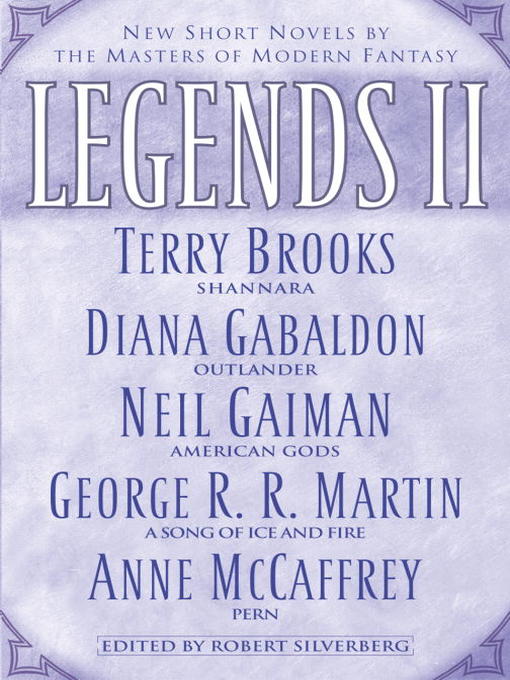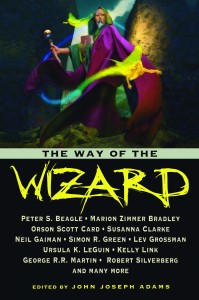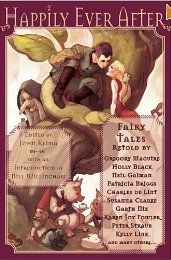Neil Gaiman
Books: Fantasy | Comics | Horror | Short Stories
Good Omens (1990), Smoke and Mirrors (1998), Stardust (1999), American Gods (2001), Anansi Boys (2005)
The Monarch of the Glen (2004)
Preludes and Nocturnes (1991), The Doll's House (1991), Dream Country (1991), Season Of Mists (1992), A Game Of You (1993), Fables And Reflections (1993), Brief Lives (1994), World's End (1994), The Kindly Ones (1996), The Wake (1997), The Dream Hunters (1999), Sandman: Endless Nights (2003)
Graphic Novels
Stardust (1997), Marvel 1602 (2006), The Book of Ballads, Death, Mr. Punch
Coraline (2002), Wolves in the Walls (2003) with Dave McKean, The Graveyard Book (2008)
Snow White, Blood Red (1993), The Year's Best Fantasy and Horror: Seventh Annual Collection (1994), Ruby Slippers, Golden Tears (1995), The Year's Best Fantasy & Horror: Eighth Annual Collection (1995), The Sandman Book of Dreams (1996), A Magic-Lover's Treasury of the Fantastic (1998), A Wolf at the Door (2000), The Green Man (2002), Swan Sister (2003), Year's Best Fantasy 3 (2003), Year's Best Fantasy and Horror: Sixteenth Edition (2003), Legends II (2004), Year's Best Fantasy 4 (2004), The Book of Ballads (2004), The Faery Reel (2004), The Year's Best Fantasy and Horror: Seventeenth Annual Collection (2004), Outsiders: 22 All-New Stories From the Edge (2005), Year's Best Fantasy 5 (2005), By Blood We Live (2009), The Secret History of Fantasy (2010), The Way of the Wizard (2010), People of the Book: A Decade of Jewish Science Fiction & Fantasy (2010), Happily Ever After (2011), Teeth (2011), Under My Hat (2012), Weird Detectives: Recent Investigations (2013), Street Magicks (2016)
Good Omens (1990) with Terry Pratchett
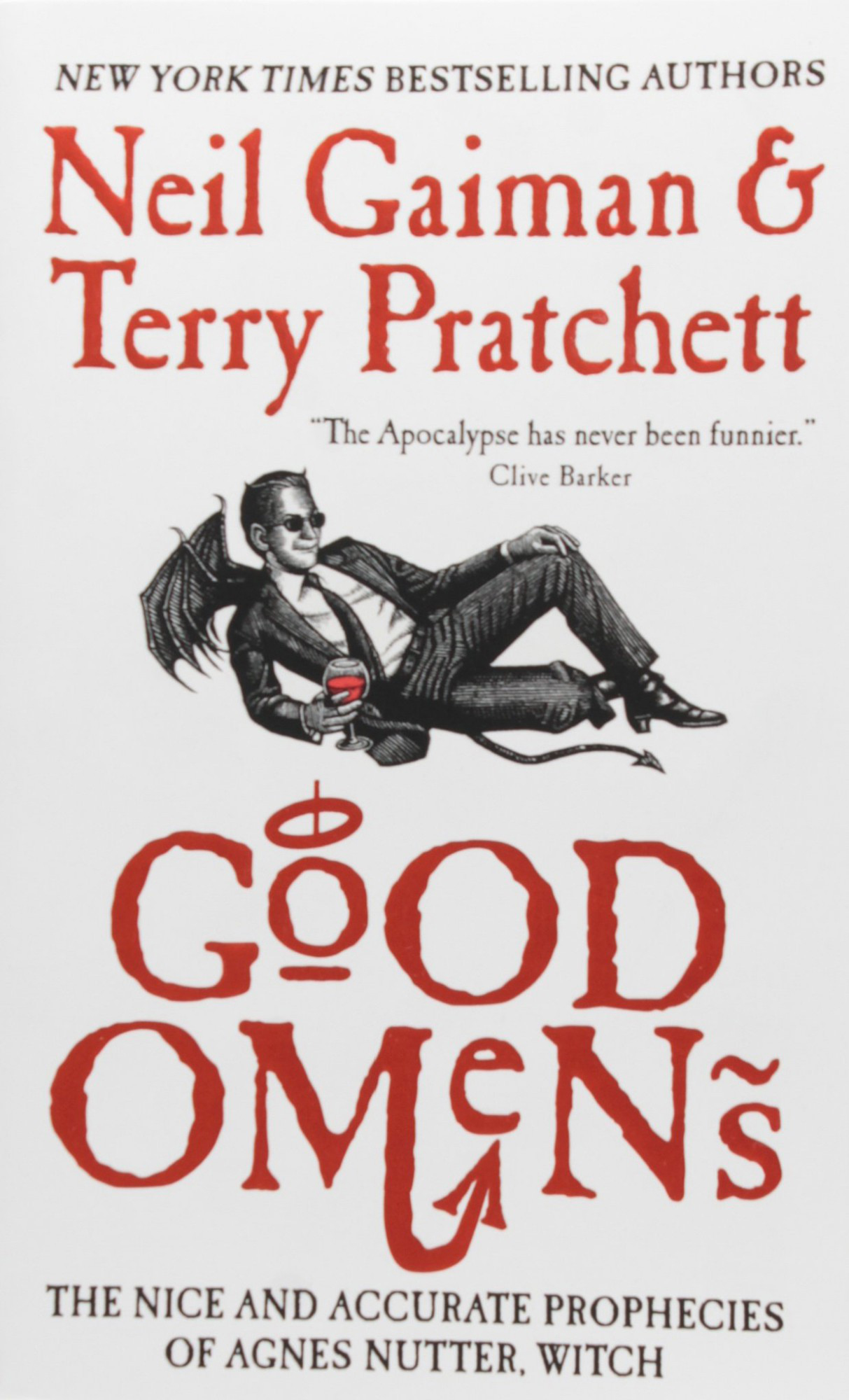 Good Omens is one of my all time favorite books, and one that I'd take with me to be stranded on a desert island, because it's funny.
Good Omens is one of my all time favorite books, and one that I'd take with me to be stranded on a desert island, because it's funny.
Really funny.
With lots of passages that make me giggle, and even laugh out loud, not just when I read them, but even when I go back and think about them later. Like:
(C)ourting couples had come to listen to the splish and gurgle of the river in the Sussex sunset. He'd done that with Maud, his missus, before they were married. They'd come here to spoon, and on one memorable occasion, fork.
Even the footnotes are funny.
(24) So he drove out the man; and he placed at the east of the garden of Eden Cherubims, and a flaming sword which turned every way, to keep the way of the tree of life... 25 And the Lord spake unto the Angel that guarded the eastern gate, saying Where is the flaming sword which was given unto thee? 26 And the Angel said, I had it here only a moment ago, I must have put it down some where, forget my own head next. 27 And the Lord did not ask him again.
But in addition to being funny, the book is just plain good. The characters are great, the story is great, the only weakness I can think of is that the whole thing has to end.
As far as the story: it's England, it's the Apocalypse, and the Antichrist is coming into his powers, except that, being eleven and having been misplaced as a baby, he doesn't really know about his powers. The only people who really know what's going on are an angel and a demon who've been on Earth so long they've gone native, and a young woman, Anathema Device, who is guided by her family heirloom, "The Nice and Accurate Prophecies of Agnes Nutter."
Although I like Anathema, I have to say that my favorite characters are Aziraphale and especially Crowley. There's something about a demon with verdant, thriving houseplants. (And I wonder whether his method really works. If so, I might consider using it.)
The thing about Good Omens is that Terry Pratchett and Neil Gaiman together manage to be even funnier than they are alone, which is pretty impressive, since I find both of them quite amusing.
If you haven't read this book, you should. It's really that good.
Oh, for Neil Gaiman and Terry Pratchett fans who have not yet read this book, Terry Pratchett's DEATH and not Neil Gaiman's Death, is one of the Hell's Angels of the Apocalypse.
"Woss the matter with you?" asked Big Ted, irritably. "Go on. Press 'D.' Elvis Presley died in 1976."
I DON'T CARE WHAT IT SAYS, said the tall biker in the helmet, I NEVER LAID A FINGER ON HIM.
March 2005 | Rating: 10/10
Stardust (1999)
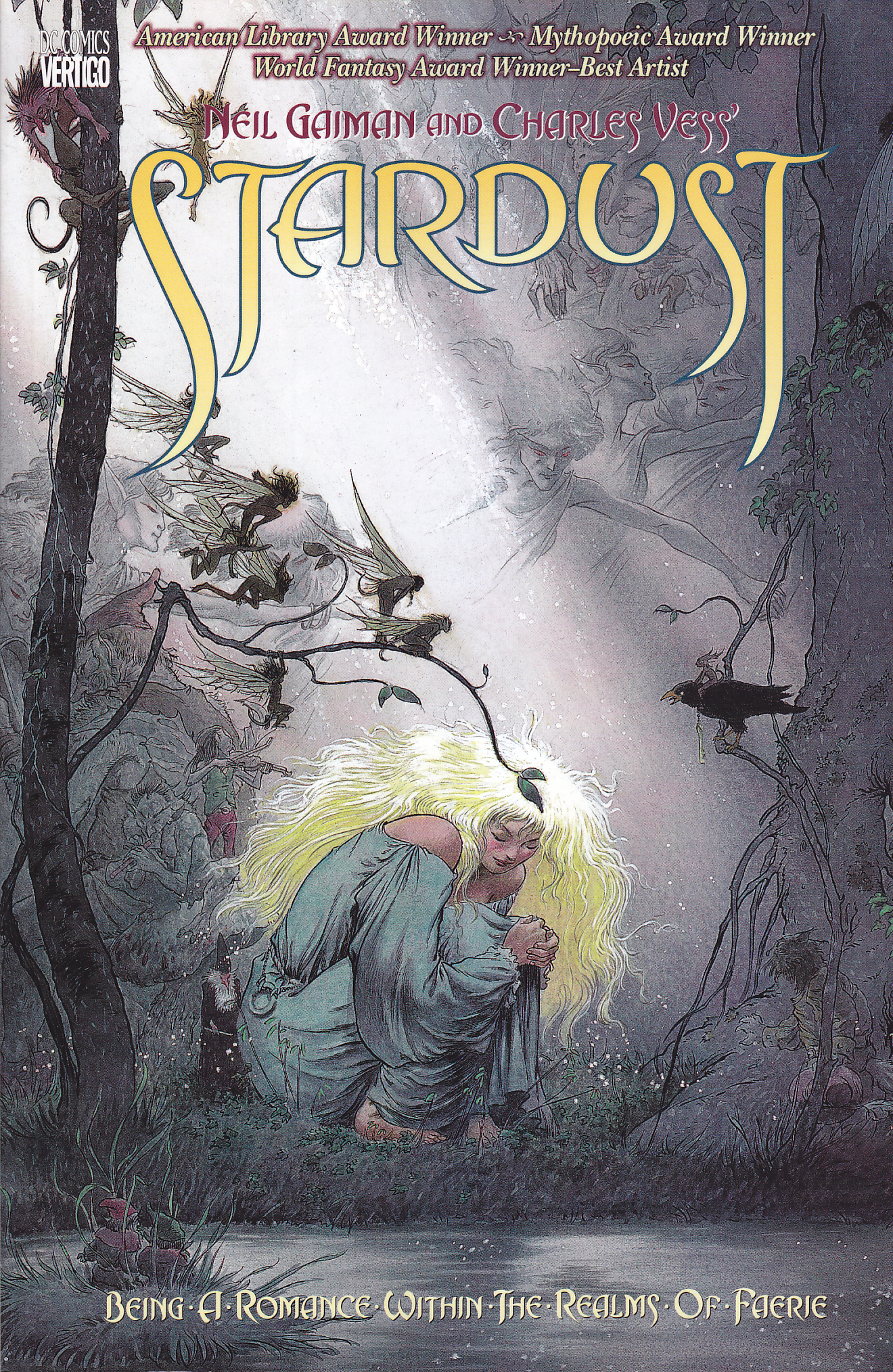 Stardust reads much like a folktale, but not a folktale that I recognized, and certainly not a cleaned up Disney tale. As with everything else of his I have read, I would highly recommend Stardust.
Stardust reads much like a folktale, but not a folktale that I recognized, and certainly not a cleaned up Disney tale. As with everything else of his I have read, I would highly recommend Stardust.
I also recommend the version illustrated by Charles Vess.
March 2008 | Not Rated
Smoke and Mirrors (2001)
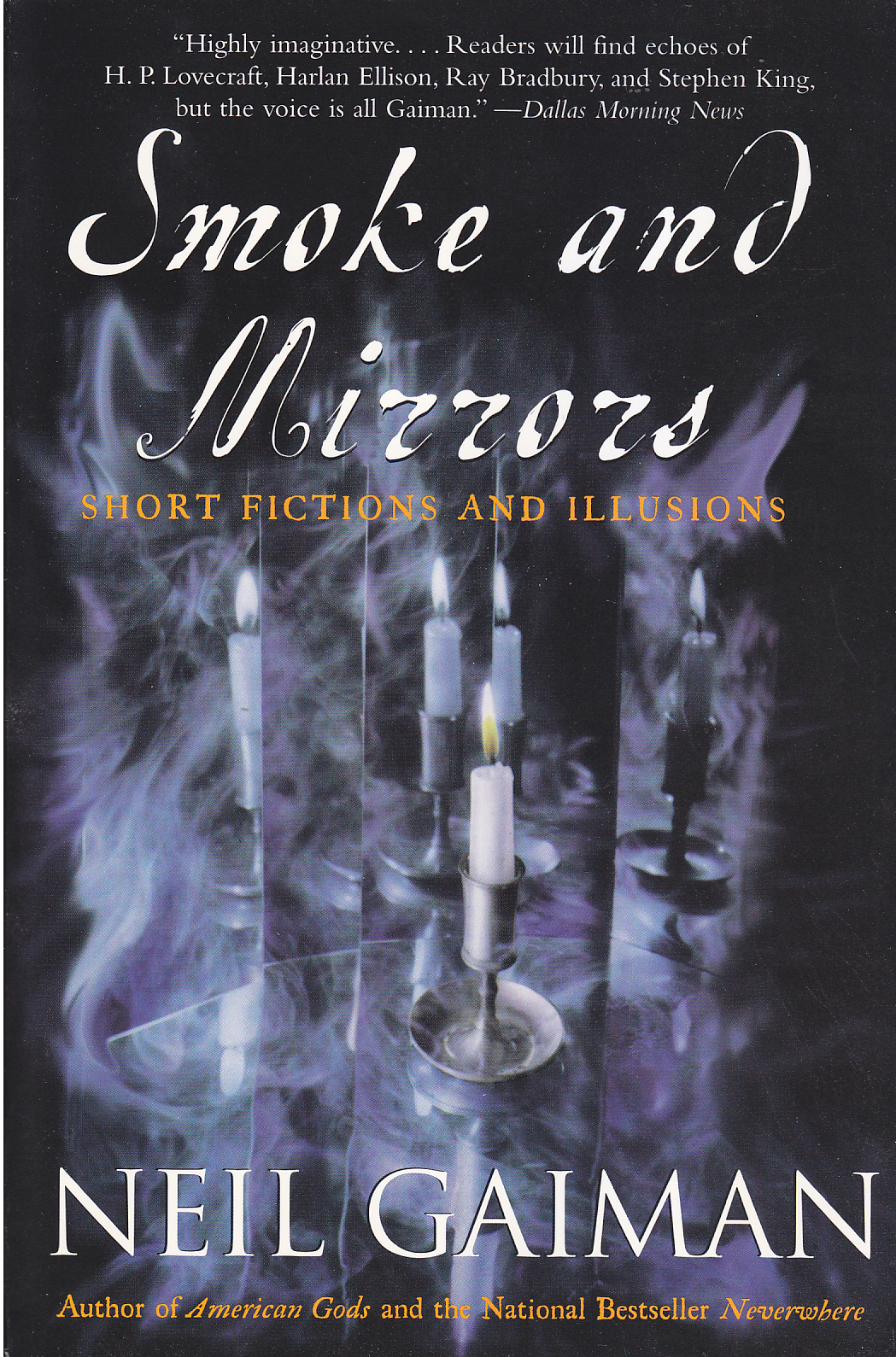 I started this book awhile ago, and at the time, the story I started reading was too dark for me, so I put it away for awhile. I picked it up again because I was desperately looking for books with short stories--books that I can put down with more ease that I can other books, and on the second read, I wasn't able to figure out what I had read the first time that was so dark. It seems that it took on proportions beyond itself while I was away from it.
I started this book awhile ago, and at the time, the story I started reading was too dark for me, so I put it away for awhile. I picked it up again because I was desperately looking for books with short stories--books that I can put down with more ease that I can other books, and on the second read, I wasn't able to figure out what I had read the first time that was so dark. It seems that it took on proportions beyond itself while I was away from it.
That said there are a lot of very dark stories in this book, and even some of the stories I really liked had very dark overtones. Not sure whether my tastes of changed, or whether I am just becoming more immune to darker fiction that is as much horror as it is fantasy, or whether I'd just built it up to be bigger than it was. Immaterial to this book of course, but you'll have that.
Murder Mysteries is two stories in one. I love the story within a story, but the wrap around story is really quite creepy. It reminds me a bit of Stephen Brust's To Reign in Hell, except that the character of God is much more sympathetic in this story.
Shoggoth's Old Peculiar is very good, with the creepy far underneath, but still there. I supposed that knowing more about H.P. Lovecraft would have made the story better, but since I don't like scary things, just knowing the basics worked for me.
Only the End of the World Again made me think about Werewolves in a way that I hadn't before, but probably should have. After all, if one takes on the shape of a beast, mightn't they also take on the nature of one? And how do you deal with it when you awaken?
American Gods (2001)
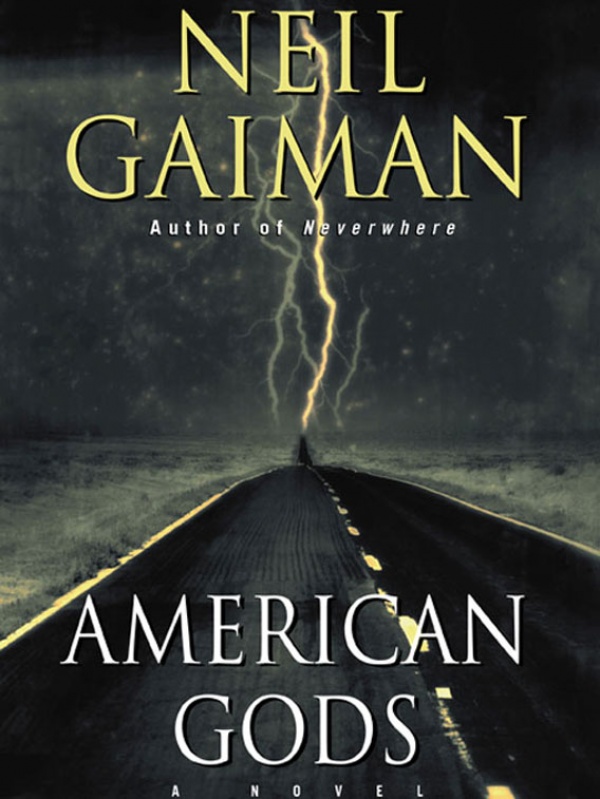 Neil Gaiman integrates mythology with urban fantasy, and as always has fantastic characters. The story drew me in immediately, and I managed to read the entire book in two evenings (not that unusual for me, but still these were week nights!) I was fascinated by the idea that the various and assorted American Gods would interact with each other.
Neil Gaiman integrates mythology with urban fantasy, and as always has fantastic characters. The story drew me in immediately, and I managed to read the entire book in two evenings (not that unusual for me, but still these were week nights!) I was fascinated by the idea that the various and assorted American Gods would interact with each other.
The Old Gods--the Norse, the Irish, the African--are clinging to the edges of life, surviving and finding worship however they can. Shadow, just released from prison, is hired by Mr. Wednesday to meddle in the affairs of these Gods.
I liked the idea that once a God is no longer worshiped he or she does not really die, but instead can become simply do their own thing--what they need to do to survive. There is something comforting about the thought that all the old Gods who were brought to this land by their worshipers may still be here, even if the worshippers are long gone. Of course thinking about it, I think that this topic was briefly covered in Piers Anthony's "Incarnation of Immortality" series, but not like this. I also was reminded in parts of Guy Gavriel Kay's "Fionovar Tapestry" series, which also dealt with a good deal of mythology and folklore.
What should I believe? thought Shadow, and the voice came back to him from somewhere deep beneath the world, in a bass rumble: Believe everything.
Published by HarperCollins
- January 2005 | Rating: 9/10
- June 2011 | Rating: 10/10
- July 2016 | Rating: 10/10
Coraline (2002)
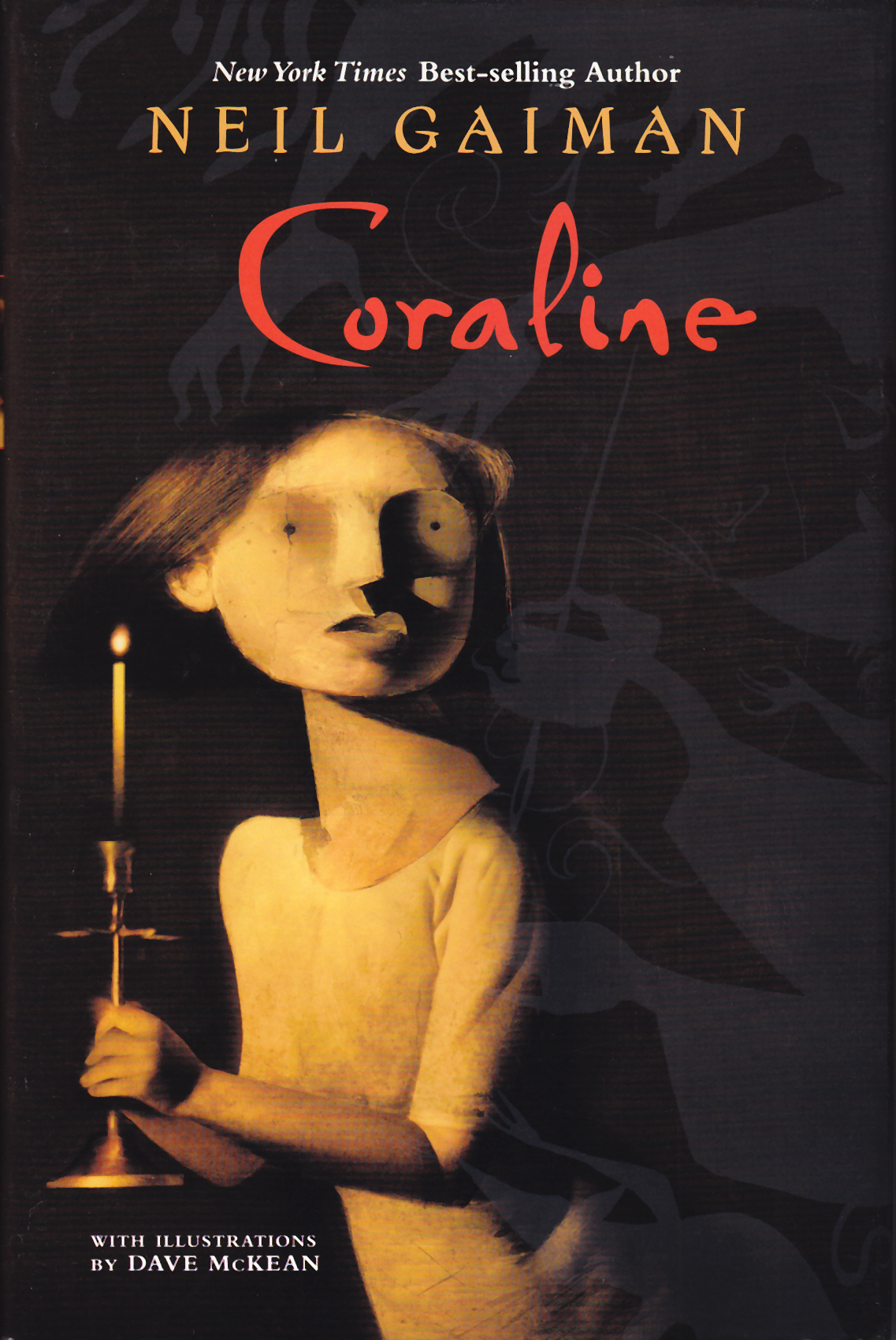 Coraline is a very good book, and being a young adult (whatever that means) book, it only took me a couple of hours to read. It's a little dark, but that's still a lot less dark than watching the news (something that kids don't do, although they probably should, except for the fact that it's all so depressing).
Coraline is a very good book, and being a young adult (whatever that means) book, it only took me a couple of hours to read. It's a little dark, but that's still a lot less dark than watching the news (something that kids don't do, although they probably should, except for the fact that it's all so depressing).
I particularly liked the way he worked out how she had to take care of things herself. She did the right thing of asking adults for help--it just happened not to work out, and for reasonable reason. (okay, perhaps not how it would have happened in reality, but it wasn't unreasonable.) I think that is important, because if a book is supposed to be based somewhat in our reality, the bits that happen in our reality should conform to the way things work. If it's an alternate reality, or a reality that exists beyond the reality we currently perceive, that's okay, but people in the "normal" reality should act like people on a "normal" reality.
And the point of all that rambling was the fact that Neil Gaiman's characters do that in Coraline. Otherwise, there are bits that are just gruesome enough that even though the book is about a female character, I think that smaller people of the male persuasion would like the book anyway. And of course for us adults, it's immaterial whether the lead character is a boy or a girl, what is important is that it's a good story, and as usual, that's what Neil Gaiman gives.
Wolves in the Walls (2003) with Dave McKean
 I've been perusing the children's bookshelves recently, looking for gifts for our nephew Wilson, and discovered that an adult buying children's books doesn't get the strange looks I expected, so I have no problems purchasing Wolves in the Walls for myself, although I didn't tell this person at the register the book was for me. Let them think what they will.
I've been perusing the children's bookshelves recently, looking for gifts for our nephew Wilson, and discovered that an adult buying children's books doesn't get the strange looks I expected, so I have no problems purchasing Wolves in the Walls for myself, although I didn't tell this person at the register the book was for me. Let them think what they will.
Wolves in the Walls is collaboration between Neil Gaiman and Dave McKean. Neil Gaiman is, of course, one of my favorite writers, so that made this an easy choice. Dave McKean has worked with Neil Gaiman on various other projects, including the covers of the 'Sandman' collections.
The book tells the tale of Lucy, who tries to tell her family that there are wolves in the walls of their house, but no one believes her. The writing reminds me less of other books that Neil Gaiman has written, and more like the bits of prose that occasionally appear in his journal and delight me to no end.
"Anyway, you know what they say about wolves," said her father. "If the wolves come out of the walls, it's all over."
"Who says that?" asked Lucy.
"People. Everybody. You know," said her father, and he went back to practicing his tuba."
That brief exchange me reminds me both of everything that was so frustrating about talking to people. People frequently give children the quick and easy answer, assuming that they won't understand a more complicated answer, or have patience for a more complicated answer, and so children are frequently given an easy mean-nothing answer.
But if you think about it, the same holds true for adults. If you have ever questioned a practice at the office, you'll sometimes learn that why things are done the way they are, is simply because "that is the way they have always been done," and no one knows why. So perhaps we give children the easy answer, in the hopes that as adults they will accept the easy answer instead of asking the hard questions of "Why?"
The artwork is, like much of what I have seen of Dave McKean's work, dark, although this is much lighter than his 'Sandman' covers. It is a mixture of photographs and drawings, melded together. What is interesting is that the art used to depict Lucy and her family and her pig puppet is the more realistic photographic type depiction, while the wolves are drawn almost exclusively as black and white sketches, with minimal color and realism.
As far as a recommendation, I liked it, and whether being a child at heart makes that a good recommendation for an actual child, you'll have to decide for yourself.
Anansi Boys (2005)
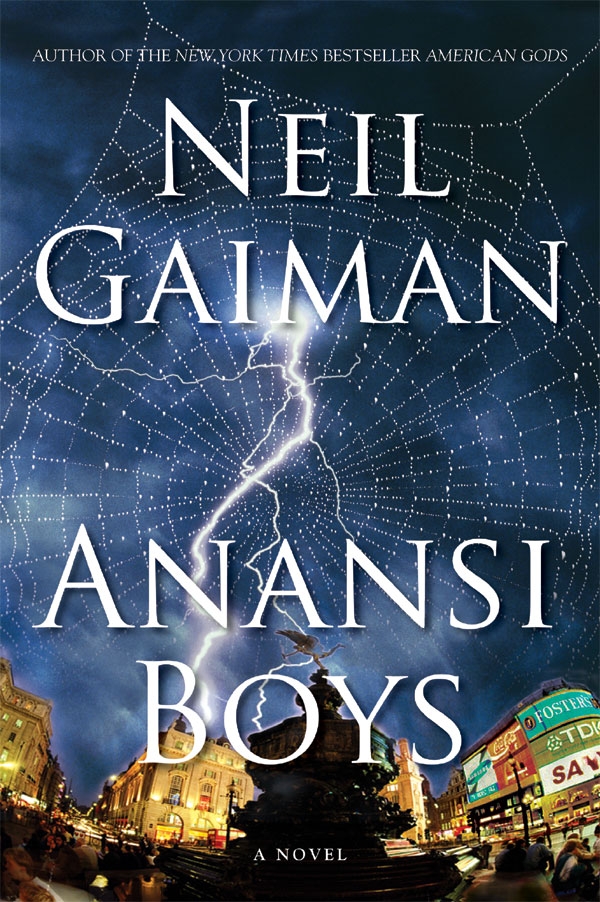 All summer I went back and forth over whether I was going to get Neil Gaiman's new book Anansi Boys in hardback, or wait until it came out in paperback. On one hand, I greatly prefer paperback books–they're smaller and lighter. On the other hand, I really didn't want to wait another year to read a new Neil Gaiman book.
All summer I went back and forth over whether I was going to get Neil Gaiman's new book Anansi Boys in hardback, or wait until it came out in paperback. On one hand, I greatly prefer paperback books–they're smaller and lighter. On the other hand, I really didn't want to wait another year to read a new Neil Gaiman book.
Needless to say, I broke down and bought the book. And apparently lots of other felt the same way, as Anansi Boys hit the New York Times best seller list at #1. (Yay Neil Gaiman!)
Those who read American Gods will remember Aunt Nancy, or Anansi. Anansi Boys is about Anansi's sons, Fat Charlie and Spider. Fat Charlie lives in England and has always been mortified by his father, who has embarrassed Charlie in as many was possible, including sticking him with the nickname "Fat Charlie." Just as the children of hippies grow up to be accountants, the son of trickster Anansi grew up refusing to be amused.
Anansi Boys is shorter than I had expected--American Gods was a huge book, and for some reason I was expecting the same here. But that was fine--I like long books, but I like it a little better when an author can tell a story in a shorter format.
The tone was much lighter than American Gods, sort of if it had been crossed with Good Omens It was also more amused with itself--fitting for a book about Anansi I think.
As with American Gods I found it interesting that the characters described in great detail, and again I quite liked it. Knowing Aunt Nancy, I knew that Fat Charlie and Spider were black, but Neil Gaiman wastes little discussing the race of the characters in this book, and I quite like it, because in this type of fantasy it doesn't and shouldn't--matter what race someone is. At least that's my feeling. Neil Gaiman tells us that Fat Charlie isn't actually fat--just a little soft around the middle, and that Spider is lean and hard in comparison. Do we need much more information than that?
This is a follow-up of sorts to American Gods. It's a follow-up only because it's set in the same world, and contains Aunt Nancy/Anansi.
But the story isn't about Anansi. It about his son Fat Charlie.
If you think your parents are embarrassing, imagine having Anansi as a father. Anansi the trickster, the trouble-maker.
(H)e took a handful of mixed nuts from the bowl on the table and began to toss them into his mouth, chomping down on them as if each nut was a twenty-year-old indignity that could never be erased.
I have much sympathy for Fat Charlie, because this is EXACTLY how I feel:
If something that even looked like it might be embarrassing was about to happen on his television screen Fat Charlie would leap up and turn it off. If that was not possible, say if other people were present, he could leave the room on some pretext ad wait until the moment of embarrassment was sure to be over.
I have done that. I hate movies and shows where the humor comes from embarrassment. Hate them. So how could I not be empathetic to Fat Charlie?
In his dreams, Fat Charlie was himself, only clumsier.
Yeah, that too. Which makes Fat Charlie's brother, Spider, even harder to take:
His brother looked like Fat Charlie wished he looked in his mind.
Of course, there are characters besides Charlie and Spider. There is Fat Charlie's boss, Grahame Coats.
It wasn't that people liked Grahame Cats, or that they trusted him. Even the people he represented thought he was a weasel. But they believed that he was their weasel, and in that they were wrong.
Yeah, that pretty much sums up someone I have to deal with in a regular basis.
But don't worry, things get better for Fat Charlie. It's just they have to get really really worse before they get better.
The style of the story is different from his previous books. It's not written like a fairy tale like Stardust, but it's much lighter in tone than American Gods. For me, the tone in each book is different, yet I can always catch glimpses of his voice that tells me this is a Neil Gaiman book.
And as always his storytelling is excellent. I'm not going to say that no one else spins a tale like Neil Gaiman, because that wouldn't be true. However, there are not a lot of authors who write that well, and it is always wonderful when one of them writes another book.
I also really liked the cover. Important bits are there, although you don't know it until you've read the book, so it doesn't give anything before you read the story. And I loved the chapter titles.
I really liked Anansi Boys. I like everything that Neil Gaiman has written. My only wish is that I not have to wait four more years for another novel.
Published by HarperCollins
- October 2005 | Rating: 8/10
- June 2013 | Rating: 8.5/10
The Graveyard Book (2008)
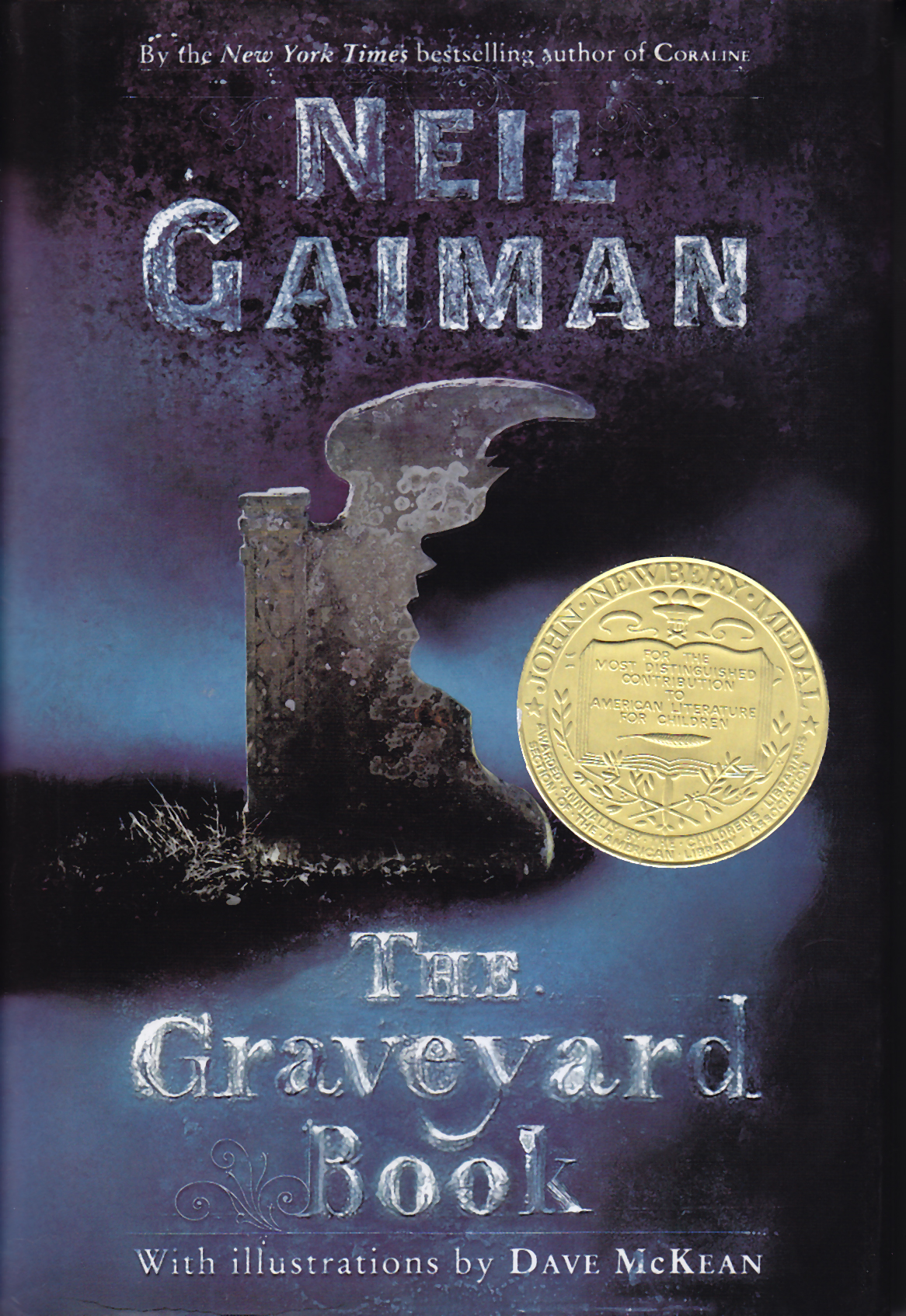 Nobody Owens lives in a graveyard.
Nobody Owens lives in a graveyard.
I've known this for quite awhile. You see, I read Neil Gaiman's blog, and he'd been talking about The Graveyard Book long before he every got around to writing it. So I knew there would one day be a book about a boy who grew up in a graveyard and was raised by ghosts.
I even knew the story came about because his son used to play in a graveyard next to their home when he (the son) was a toddler. So why didn't I order the book when it first came out? No idea. Then I knew it was up for the Newbury award, and then I knew it had won, and that Stephen Colbert had mocked it, and then Neil Gaiman had gone on the Colbert Report and allowed Stephen Colbert to mock him in person about his book. And still I didn't order the book.
Finally, I broke down and ordered The Graveyard Book. The almost immediately I read it.
Now I will admit one thing. For some reason I thought The Graveyard Book was more like Wolves in the Walls instead of Coraline. Not that I expected it to be anything like those books particularly. I mean the age groups–I thought it was for a younger age group.
Yes. I'd seen the cover. But don't forget, I love and own The Boy Who Drew Cats and The Spider and the Fly (and have given both as gifts to young friends.) So I have a very different idea of "age appropriate" than most other people. (I clearly remember being a child, and loved reading the story of "The Boy Who Drew Cats" because the image of the cats fangs dripping with blood was awesome. And really, a lot of the best books for kids are quite morbid. Which is why they're so good.)
Yes, the book starts with a killer with a knife. Yes, there are scary bits. Bit they're awesome scary bits–just what should appeal to kids. After all, the best children's books always have orphans as the main characters–how else could a kid have exciting and terrible adventures? If you have a young person in your life, don't hesitate to get them The Graveyard Book. It's just the right kind of book to appeal to kids with gruesome and scary and a boy who is brave even when it would be better for him not to be brave.
May 2009 | Rating: 9/10
Snow White, Blood Red (1993) edited by Ellen Datlow & Terri Windling
I often have a hard time putting down interesting books. Which means that if I'm reading a book I real like before bed, I end up staying up past my bed time instead of falling asleep. One solution is to read non-fiction before bed. The other solution is to read short story anthologies. Unfortunately, there are not a lot of high quality anthologies out there. At least, not enough to keep up with the rate at which I can read.
So I decided to go back and reread Ellen Datlow and Terri Windling's fantasy anthology Snow White, Blood Red. This book has a whole bunch of things going for it at once: it's edited by Ellen Datlow and Terri Windling; it's got stories by Neil Gaiman and Charles de Lint; and the stories are retellings or reinventions of folk and fairy tales. Mostly fairy tales in this book.
Plus, a gorgeous cover by Thomas Canty.
For those who are unfamiliar with folk tales and fairy tales, many of the original tales--before they got cleaned up and given to kids--were filled with sex, (in addition to the casual violence of people getting eyes poked out or chopping off bits of feet or being shoved into ovens.)
In other words, these are not stories for children.
- Like a Red, Red Rose by Susan Wade
- The Moon is Drowning While I Sleep by Charles de Lint
- The Frog Prince by Gahan Wilson
- Stalking Beans by Nancy Kress
- SnowbyDrop by Tanith Lee
- Little Red by Wendy Wheeler
- I Shall Do Thee Mischief in the Wood by Kathe Koja
- The Root of the Matter by Gregory Frost
- The Princess in the Tower by Elizabeth A. Lynn
- Persimmon by Harvey Jacobs
- Little Poucet by Steve Rasnic Tem
- The Changelings by Melanie Tem
- The Springfield Swans by Caroline Stevermer and Ryan Edmonds
- Troll Bridge by Neil Gaiman
- A Sound, Like Angels Singing by Leonard Rysdyk
- Puss by Esther M. Friesner
- The Glass Casket by Jack Dann
- Knives by Jane Yolen
- The Snow Queen by Patricia A. McKillip
- Breadcrumbs and Stones by Lisa Goldstein
Also, the stories I liked less tended towards horror. This book is a collection of fantasy and horror (as are many Ellen Datlow-Terri Windling anthologies) so I expected that there were going to be at least one or two stories that I don't care for. So it didn't really bother me.
As best I can tell, this anthology is still available, so if you like short stories, this is an anthology you won't want to miss. However, if you like anthologies, this is probably one you already have sitting on your shelves
Publisher: Eos
Rating: 7/10
The Year's Best Fantasy and Horror: Seventh Annual Collection (1994) edited by Ellen Datlow & Terri Windling
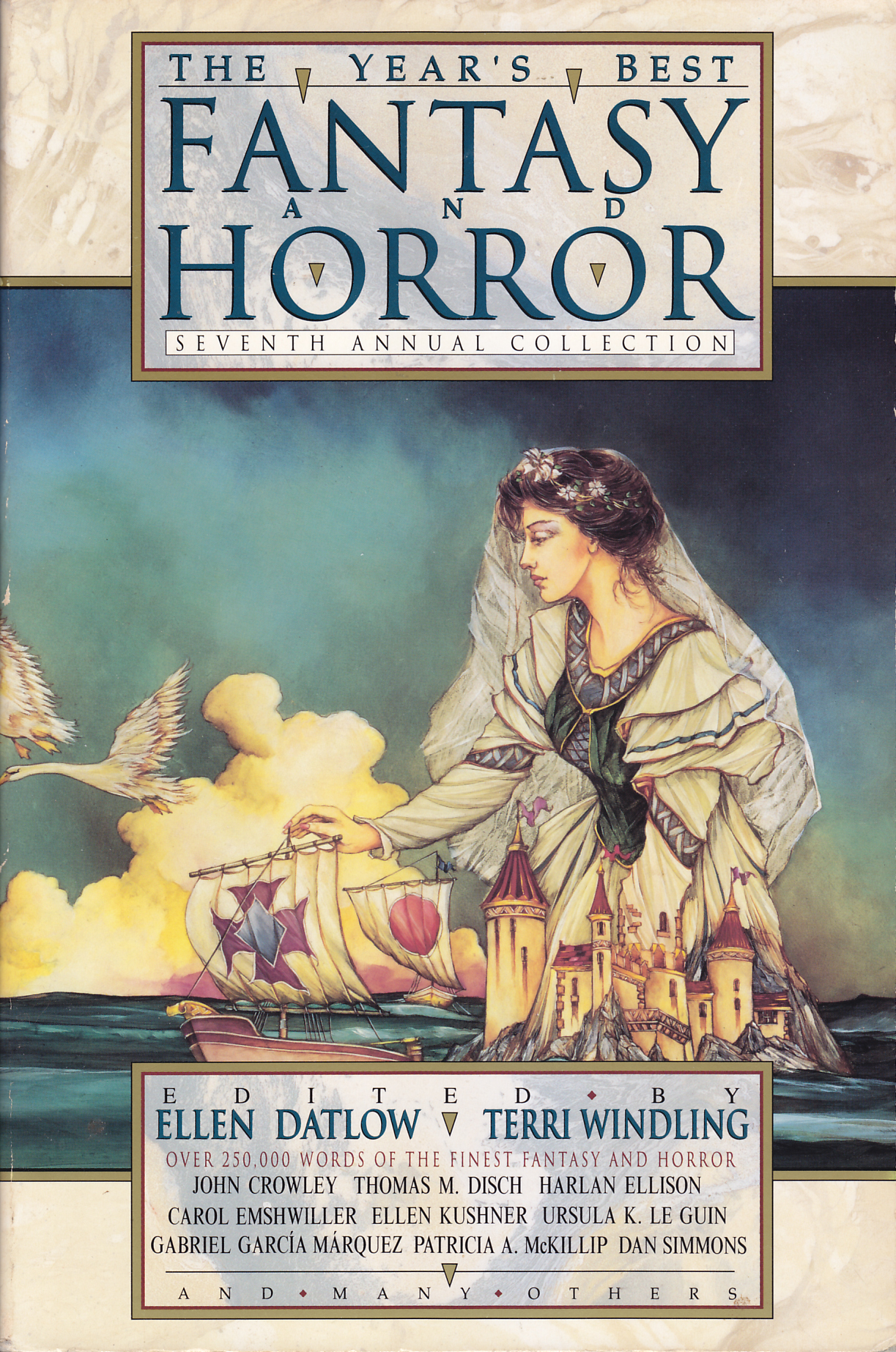 Troll Bridge by Neil Gaiman
Troll Bridge by Neil Gaiman
Published by St Martins Press
Ruby Slippers, Golden Tears (1995) edited by Ellen Datlow & Terri Windling
- Ruby Slippers by Susan Wade
- The Beast by Tanith Lee
- Masterpiece by Garry Kilworth
- Summer Wind by Nancy Kress
- This Century of Sleep, or Briar Rose Beneath the Sea by Farida S. T. Shapiro
- The Crossing by Joyce Carol Oates
- Roach in Loafers by Roberta Lannes
- Naked Little Men by Michael Cadnum
- Brother Bear by Lisa Goldstein
- The Emperor Who had Never Seen a Dragon by John Brunner
- Billy Fearless by Nancy A Collins
- The Death of Koshchei the Deathless by Gene Wolfe
- The Real Princess by Susan Palwick
- The Huntsman's Story by Milbre Burch
- After Push Comes to Shove by Milbre Burch
- Hansel and Grettel by Gahan Wilson
- Match Girl by Anne Bishop
- Waking the Prince by Kathe Koja
- The Fox Wife by Ellen Steiber
- The White Road by Neil Gaiman
- The Traveler and the Tale by Jane Yolen
- The Printer's Daughter by Delia Sherman
Published by Harper Collins
The Year's Best Fantasy & Horror: Eighth Annual Collection (1995) edited by Ellen Datlow & Terri Windling
Snow, Glass, Apples by Neil Gaiman
Published by St Martins Press
The Sandman Book of Dreams (1996) edited by Neil Gaiman and Ed Kramer
- Masquerade and High Water by Colin Greenland
- Chain Home, Low by John M. Ford
- Stronger Than Desire by Lisa Goldstein
- Each Damp Thing by Barbara Hambly
- The Birth Day by B.W. Clough
- Splatter by Will Shetterly
- Seven Nights in Slumberland by George Alec Effinger
- Escape Artist by Caitlin R. Kiernan
- An Extra Smidgeon of Eternity by Robert Rodi
- The Writer's Child by Tad Williams
- Endless Sestina by Lawrence Schimel
- The Gate of Gold by Mark Kreighbaum
- A Bone Dry Place by Karen Haber
- The Witch's Heart by Delia Sherman
- The Mender of Broken Dreams by Nancy A. Collins
- Ain't You 'Most Done? by Gene Wolfe
- Valóság and Élet by Steven Brust
- Stopp't-Clock Yard by Susanna Clarke
- Afterword: Death by Tori Amos
It took me several months to read this book, not because it was boring, but because I was carrying it back and forth to work to read at lunch, or if I had to go somewhere for an appointment. This means that as I finished the last story in the book, I could barely remember the first story in the book.
I liked B.W. Clough's The Birth Day, a story of the beginning of an idea. I also liked Robert Rodi's An Extra Smidgen of Eternity, which is the second of two stories about Wanda from A Game of You. I liked A Bone Dry Place by Karen Haber, because it had several of the Endless interacting, although the story that tied everything together confused me, even on a second read. One of my favorite stories was Nancy A. Collin's The Mender of Broken Dreams. I quite liked the idea of the creatures of the realm of dream wondering about themselves. I of course loved Steven Brust's Valosag and Elet, but then I tend to love everything that Steven Brust writes, so you'll have to consider the source. One of the stories merits is that it is written as a folktale, and since I love folktales, that made it all the more endearing.
The horror tales were my least favorite. Will Shetterly's Splatter was set during The Doll's House collection in the Collectors, one of the more gruesome tales. The Writer's Child by Tad Williams is disturbing, although everything is alright in the end. But I don't particularly care for horror, so you'd best not take my opinion if you like it yourself. The stories were well written, but they were not anything that I particularly enjoy so take that as you will.
There was so much more that I wanted to say about these stories, but it's been over a month since I finished the collection, so I best say this for now, lest I forget everything.
These were stories written in the world of the Sandman, but they were not written by Neil Gaiman. If you liked Sandman and like short stories, then you'll like this collection. But if you are looking for more of Neil Gaiman's writing, or know little or nothing of The Sandman, then this collection is probably not for you.
Published by Harper Torch
A Magic-Lover's Treasury of the Fantastic (1998) edited by Margaret Weis
- Gwydion And The Dragon by C.J. Cherryh
- Misericorde by Karl Edward Wagner
- The Barbarian by Poul Anderson
- The Silk And The Song by Charles L. Fontenay
- Mirror, Mirror On The Lam by Tanya Huff
- Chivalry by Neil Gaiman
- Firebearer by Lois Tilton
- The Bully And The Beast by Orson Scott Card
- A Time For Heroes by Richard Parks
- The Cup And The Cauldron by Mercedes Lackey
- The Lands Beyond The World by Michael Moorcock
Published by Aspect
Silver Birch, Blood Moon (1999) edited by by Ellen Datlow & Terri Windling
 "Introduction" by Terri Windling and Ellen Datlow
"Introduction" by Terri Windling and Ellen Datlow- "Kiss Kiss" by Tanith Lee
- "Carabosse" by Delia Sherman
- "The Price" by Patricia Briggs
- "Glass Coffin" by Caitlín R. Kiernan
- "The Vanishing Virgin" by Harvey Jacobs
- "Clad in Gossamer" by Nancy Kress
- "Precious" by Nalo Hopkinson
- "The Sea Hag" by Melissa Lee Shaw
- "The Frog Chauffeur" by Garry Kilworth
- "The Dybbuk in the Bottle" by Russell William Asplund
- "The Shell Box" by Karawynn Long
- "Ivory Bones" by Susan Wade
- "The Wild Heart" by Anne Bishop
- "You Wandered Off Like a Foolish Child to Break Your Heart and Mine" by Pat York
- "Arabian Phoenix" by India Edghill
- "Toad-Rich" by Michael Cadnum
- "Skin So Green and Fine" by Wendy Wheeler
- "The Willful Child, the Black Dog, and the Beanstalk" by Melanie Tem
- "Locks" by Neil Gaiman
- "Marsh-Magic" by Robin McKinley
- "Toad" by Patricia A. McKillip
Publisher: Avon Books
Black Heart, Ivory Bones (2000) edited by Ellen Datlow & Terri Windling
 Introduction by Terri Windling and Ellen Datlow
Introduction by Terri Windling and Ellen Datlow- "Rapunzel" by Tanith Lee
- "The Crone" by Delia Sherman
- "Big Hair" by Esther Friesner
- "The King with Three Daughters" by Russell Blackford
- "Boys and Girls Together" by Neil Gaiman
- "And Still She Sleeps" by Greg Costikyan
- "Snow in Summer" by Jane Yolen
- "Briar Rose and Witch" by Debra Cash
- "Chanterelle" by Brian Stableford
- "Bear It Away" by Michael Cadnum
- "Goldilocks Tells All" by Scott Bradfield
- "My Life as a Bird" by Charles de Lint
- "The Red Boots" by Leah Cutter
- "Rosie's Dance" by Emma Hardesty
- "You, Little Match-girl" by Joyce Carol Oates
- "Dreaming among Men" by Bryn Kanar
- "The Cats of San Martino" by Ellen Steiber
- "The Golem" by Severna Park
- "Our Mortal Span" by Howard Waldrop
- "Mr. Simonelli or the Fairy Widower" by Susanna Clarke
Publisher: Eos
A Wolf at the Door (2000) edited by Ellen Datlow & Terri Windling
I love folk tales and fairy tales, and I love the idea of stories that have been told and retold, and then finally captured on paper. The problem of course, is finding an author who is good at translating stories from an oral tradition into something that works well written.
There's something wonderful about a well-told short story, and I think that the best short stories in the world are folk and fairy tales.
Ellen Datlow and Terri Windling are very good at finding authors who can take these stories and retell them, and they always put together wonderful anthologies. They brought together thirteen writers for this collection of retold fairy tales.
Although one or two of the stories I found to be just okay, others were nothing short of excellent. It also seems as if the stories were I liked the best were towards the end of the book. For me the collection started out okay, and then got better and better the more I read.
- The Months of Manhattan by Delia Sherman
- Cinder Elephant by Jane Yolen
- Instructions by Neil Gaiman
- Mrs Big: "Jack and the Beanstalk" Retold by Michael Cadnum
- Falada: The Goose Girls Horse by Nancy Farmer
- A Wolf at the Door by Tanith Lee
- Ali Baba and the Forty Aliens by Janeen Webb
- Swans by Kelly Link
- The Kingdom of Melting Glances by Katherine Vaz
- Hansel's Eyes by Garth Nix
- Becoming Charise by Kathe Koja
- The Seven Stage a Comeback by Gergory Maguire
- The Twelve Dancing Princesses by Patricia A. McKillip
Although I don't have much of a ear for poetry, I enjoyed Neil Gaiman's poem Instructions, which was a compilation of the secrets from different stories. A Wolf at the Door, the story from which the title of the anthology was taken, was very good--especially the twist.
Not that I think the purpose of these stories is necessarily to scare us, as much as it is to make us pay attention to what is happening around us.
Publisher: Aladdin
Rating: 7/10
The Green Man : Tales from the Mythic Forest (2002) edited by Ellen Datlow & Terri Windling
- Going Wodwo (poem) by Neil Gaiman
- Grand Central Park by Delia Sherman
- Daphne by Michael Cadnum
- Somewhere in My Mind There is a Painting Box by Charles de Lint
- Among the Leaves So Green by Tanith Lee
- Song of the Cailleach Bheur (poem) by Jane Yolen
- Hunter's Moon by Patricia A. McKillip
- Charlie's Away by Midori Snyder
- A World Painted by Birds by Katherine Vaz
- Grounded by Nina Kiriki Hoffman
- Overlooking by Carol Emshwiller
- Fie, Fi, Fo, Fum by Gregory Maguire
- Joshua Tree by Emma Bull
- Ali anugne o chash (the boy who was) by Carolyn Dunn
- Remnants by Kathe Koja
- The Pagodas of Ciboure by M. Shayne Bell
- The Green Man (poem) by Bill Lewis
- The Green Word by Jeffrey Ford
Published by Viking
Swan Sister (2003) edited by Ellen Datlow & Terri Windling
I don't think I've come across a short story collection put together by Ellen Datlow and Terri Windling that I didn't like, and Swan Sister is no exception to the rule.
The stories are fairy tales retold, by a variety of authors--many some of my favorites.
- Greenkid by Jane Yolen
- Golden Fur by Midori Snyder
- Chambers of the Heart by Nina Kiriki Hoffman
- Little Red and the Big Bad by Will Shetterly
- The Fish's Story by Pat York
- The Children of Tilford Fortune by Christopher Rowe
- The Girl in the Attic by Lois Metzger
- The Harm that Sang by Gregory Frost
- A Life in Miniature by Bruce Coville
- Lupe by Kathe Koja
- Awake by Tanith Lee
- Inventing Aladdin by Neil Gaiman
- My Swan Sister by Katherine Vaz
All in all, there wasn't a weak story in this collection.
Like A Wolf at the Door, this is a collection for children and young adults. However, the stories are so well written that adults should find them just as appealing. If you like folk and fairy tales, I highly recommend this collection.
Publisher: Aladdin
Rating: 9/10
Year's Best Fantasy 3 (2003) edited by David G. Hartwell
- "Her Father's Eyes" by Kage Baker
- "Want's Master" by Patricia Bowne
- "October in the Chair" by Neil Gaiman
- "Greaves, This Is Serious" by William Mingin
- "Shift" by Nolo Hopkinson
- "A Book, by Its Cover" by P.D. Cacek
- "Somewhere in My Mind There Is a Painting Box" by Charles de Lint
- "The Pyramid of Amirah" by James Patrick Kelly
- "Our Friend Electricity" by Ron Wolfe
- "Social Dreaming of the Frin" by Ursula K. LeGuin
- "Five British Dinosaurs" by Michael Swanwick
- "The Green Word" by Jeffery Ford
- "The Comedian" by Stephan Chapman
- "The Pagodas of Ciboure" by M. Shayne Bell
- "From the Cradle" by Gene Wolfe
- "Sam" by Donald Barr
- "Persian Eyes" by Tanith Lee
- "Travel Agency" by Ellen Klages
- "A Fable of Savior and Reptile" by Steven Popkes
- "Comrade Grandmother" by Naomi Kritzer
- "Familiar" by China Mieville
- "Honeydark" by Liz Williams "A Prayer for Captain La Hire" by Patrice E. Sarath
- "Origin of the Species" by James Van Pelt
- "Tread Softly" by Brian Stableford
- "How It Ended" by Darrell Schweitzer
- "Cecil Rhodes in Hell" by Michael Swanwick
- "Hide and Seek" by Nicholas Royle
- "Death in Love" by R. Garcia y Robertson
Published by Harper Voyager
Year's Best Fantasy and Horror: Sixteenth Edition (2003) edited by Ellen Datlow & Terri Windling
Neil Gaiman - Pages from a Journal Found in a Shoebox Left in a Greyhound Bus Somewhere Between Tulsa, Oklahoma, and Louisville, Kentucky
Published by St. Martin's Griffin
The Book of Ballads (2004) by Charles Vess
- Introduction by Terri Windling
- The False Knight On The Road by Neil Gaiman
- King Henry by Jane Yolen
- Thomas the Rhymer by Sharyn McCrumb
- Barbara Allen by Midori Snyder
- The Three Lovers by Lee Smith
- Tam-Lin by Elaine Lee
- The Daemon Lover by Delia Sherman
- Twa Corbies, Sovay by Charles de Lint
- The Galtee Farmer by Jeff Smith
- Alison Gross by Charles Vess
- The Black Fox by Emma Bull
- The Great Selchie Of Sule Skerry by Jane Yolen
- Discography Notes by Ken Roseman
Publisher: Tor Books
Year's Best Fantasy 4 (2004) edited by David G. Hartwell and Kathryn Cramer
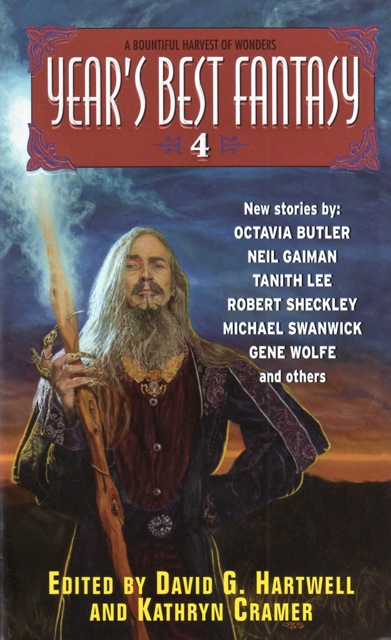
- King Dragon by Michael Swanwick
- The Big Green Grin by Gahan Wilson
- The Book of Martha by Octavia E. Butler
- Wild Thing by Charles Coleman Finlay
- Closing Time by Neil Gaiman
- Catskin by Kelly Link
- Dragon's Gate by Pat Murphy
- One Thing about the Night by Terry Dowling
- Peace on Suburbia by M. Rickert
- Moonblind by Tanith Lee
- Professor Berkowitz Stands on the Threshold by Theodora Goss
- Louder Echo by Brendan Duffy
- The Raptures of the Deep by Rosaleen Love
- Fable from a Cage by Tim Pratt
- A Quartet of Mini-Fantasies by Arthur Porges
- Señor Volto by Lucius Shepard
- Shen's Daughter by Mary Soon Lee
- Basement Magic by Ellen Klages
- The Tales of Zanthias by Robert Sheckley
- Of Soil and Climate by Gene Wolfe
- Almost Home by Terry Bisson
Publisher: Harper Voyager
Grails: Quests of the Dawn (2004) edited by Richard Gilliam and Martin H. Greenberg
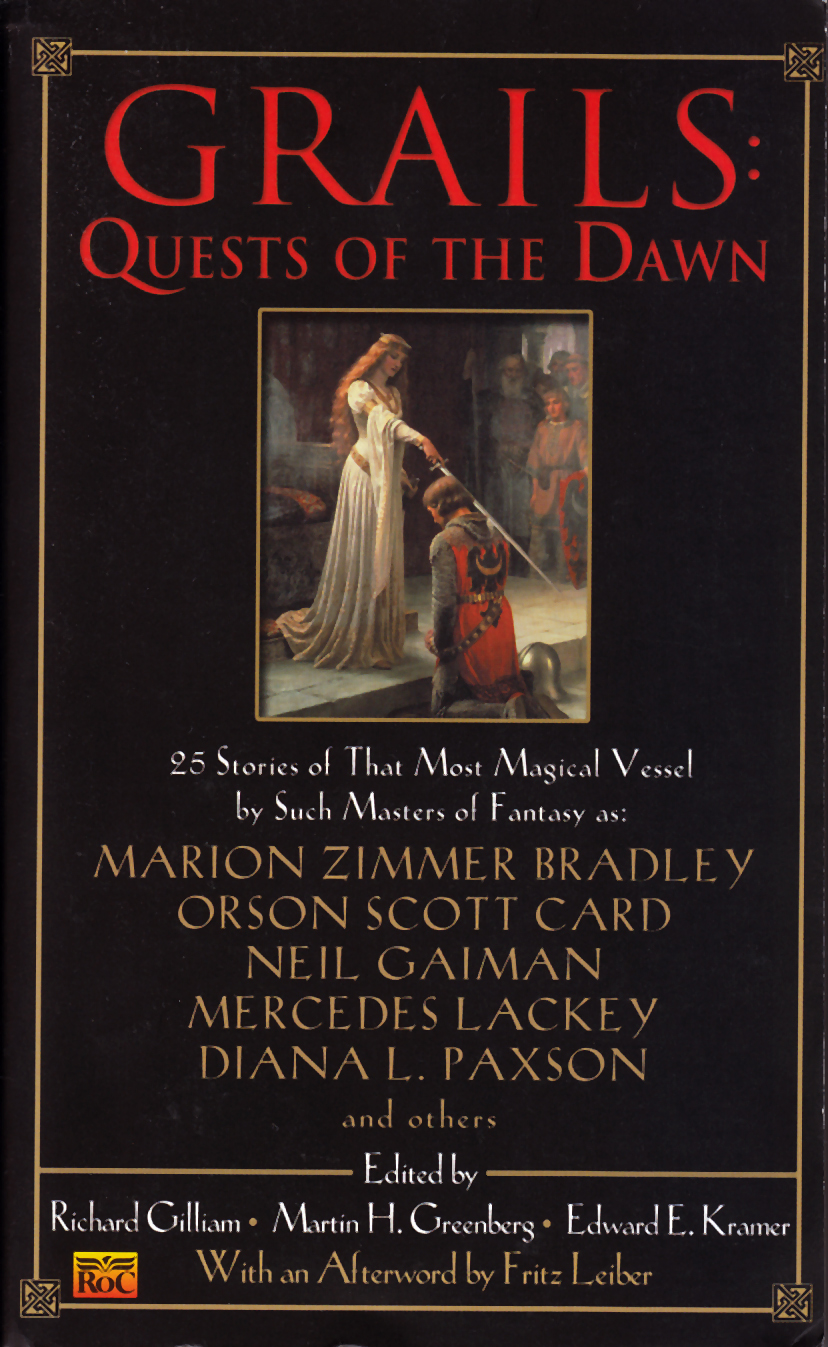
- The Question Of The Grail by Jane Yolen
- The Cup And The Cauldron by Mercedes Lackey
- The Which Overfloweth by Andre Norton
- Chalice Of Tears, Or I Didn't Want That Damm Grail Anyway by Marion Zimmer Bradley
- The Feast And The Fisher King by Diana L. Paxon
- The Gift Of Gilthaliad by Brad Strickland
- Curse Of The Romany by Ilona Ouspenskaya
- Dagda by James S. Dorr
- The Sailor Who Sailed After The Sun by Gene Wolfe
- Water by Lee Hoffman
- What You See... by Alan Dean Foster
- Storyville, Tennessee by Richard Gilliam
- Somewhere In Her Dying Heart by Lisa Lepovetsky
- Hell-Bent For Leather by Jeremiah E. Phipps
- Atlantis by Orson Scott Card
- Invisible Bars by Dean Wesley Smith
- That Way Lies Camelot by Janny Wurts
- Hitchiking Across An Ancient Sea by Kristine Kathryn Rusch
- Visions by Lawrence Watt-Evans
- The Awful Truth In Arthur's Barrow by Lionel Fenn
- Reunion by Brian M. Thomsen
- Quest Now by Margo Skinner
- Chivalry by Neil Gaiman
- Falling To The Edge Of The End Of The World by Bruce D. Arthurs
- Greggie's Cup by Rick Wilber
- The Grail Legend: An Afterword by Fritz Leiber
Publisher: ROC
Legends II (2004) edited by Robert Silverberg
I picked up this book just for the Neil Gaiman Shadow story, so the fact that I found it in the bargain bin means that any stories beyond ‘The Monarch of the Glen' were an added bonus.
- Homecoming by Robin Hobb
- The Sworn Sword by George R. R. Martin
- The Yazoo Queen by Orson Scott Card
- Lord John and the Succubus by Diana Gabaldon
- The Book of Changes by Robert Silverberg
- The Happiest Dead Boy in the World by Tad Williams
- Beyond Between by Anne McCaffrey
- The Messenger by Raymond E. Feist
- Threshold by Elizabeth Haydon
- Indomitable by Terry Brooks
- The Monarch of the Glen by Neil Gaiman
'Monarch of the Glen' was good. Very good. It made me want to go back and reread 'American Gods' Right Now. Which I have not done, but may very well do. Because I really like Shadow, and I liked reading more about him, as well as learning more about his past. I'm not sure what it is about Neil Gaiman's writing that I love so much, but it's there, and I read his on-line journal for the moments when his day to day bits turn into one of his small tales that draw me in.
Publisher: Del Rey
The Faery Reel: Tales from the Twilight Realm (2004) edited by Ellen Datlow & Terri Windling
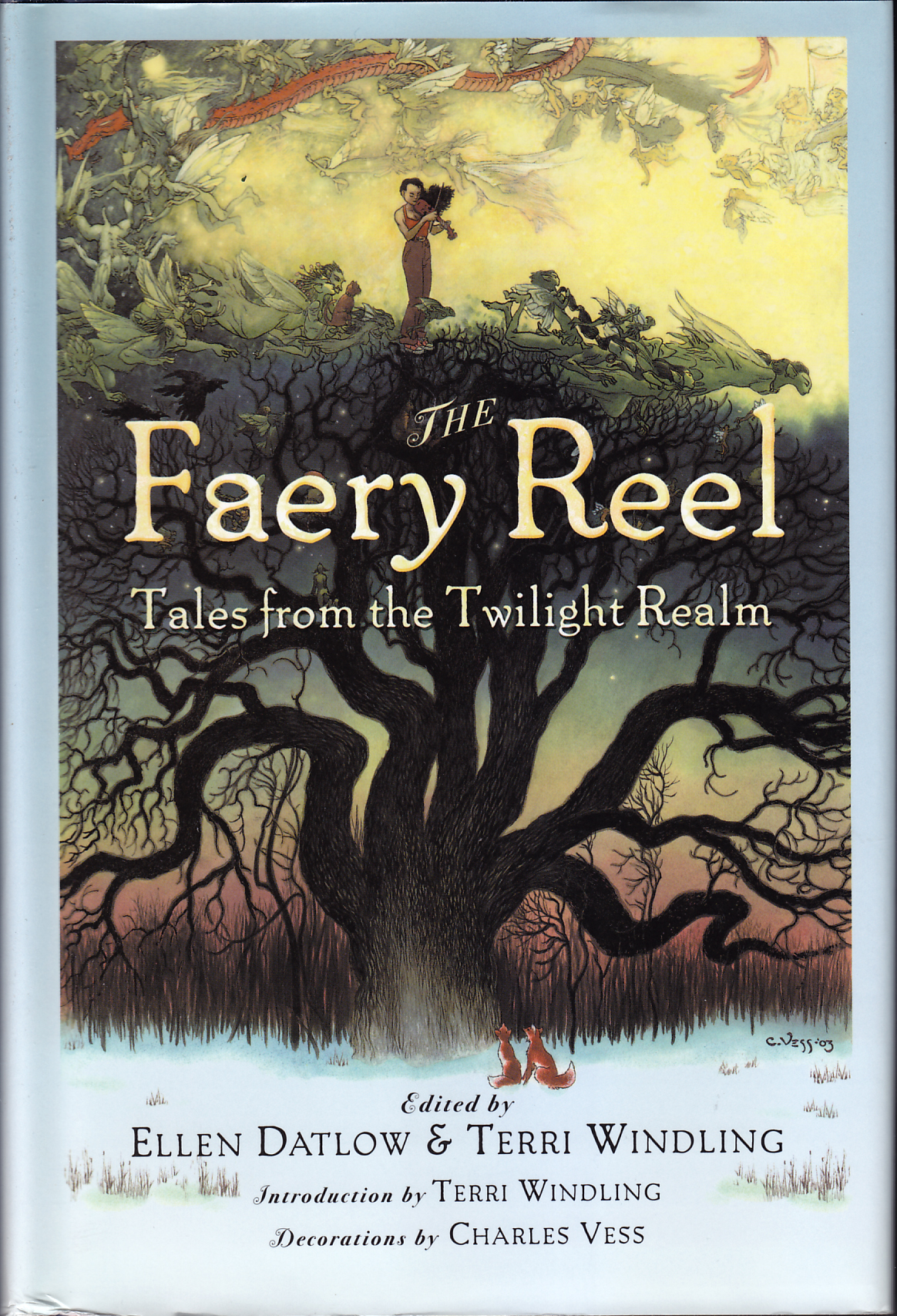
When I see a fantasy anthology edited by Ellen Datlow and Terri Windling, I'll almost always pick it up, because I know it's going to be good. Very good. This volume however, has the added bonus of poems by both Charles de Lint and Neil Gaiman.
Needless to say I snatched it up--even thought it was in hardback--when I came across it.
These faery tales are based not upon the fairies of Disney but upon the faery of folktales. As they say in the introduction:
In this book about our good neighbors, we've asked a number of our favorite writers to travel into the Twilight Realm (an ancient name for the land of Faerie) and to bring back stories of faeries and the hapless mortals who cross their path. "No butterfly-winged sprites," we pleaded. "Read the old folktales, journey farther afield, find some of the less explored paths through the Realm.
It would be hard for me not to love this book.
- The Boys of Goose Hill by Charles de Lint
- Catnyp by Delia Sherman
- Elvenbrood by Tanith Lee
- Your Garnet Eyes by Katherine Vaz
- Tengu Mountain by Gregory Frost
- The Faery Handbag by Kelly Link
- The Price of Glamour by Steve Berman
- The Night Market by Holly Black
- Never Never by Bruce Glassco
- Screaming for Aferies by Ellen Steiber
- Immersed in Matter by Nina Kiriki Hoffman
- Undine by Patricia A. McKillip
- The Oakthing by Gregory Maguire
- Foxwife by Hiromi Goto
- The Dream Eaters by A. W. Dellamonico
- The Faery Reel by Neil Gaiman
- The Shooter at the Heartrock Waterhole by Bill Congreve
- The Annals of Eelin-OK by Jeffrey Ford
- De La Tierra by Emma Bull
- How to Find Faery by Nan Fry
All in all an excellent anthology. But I hardly expected anything less.
Published by Viking
Rating: 8/10
The Year's Best Fantasy and Horror: Seventeenth Annual Collection (2004) edited by Ellen Datlow & Terri Windling
Neil Gaiman - A Study in Emerald
Published by St. Martin's Griffin
Year's Best Fantasy 5 (2005) edited by David G. Hartwell and Kathryn Cramer
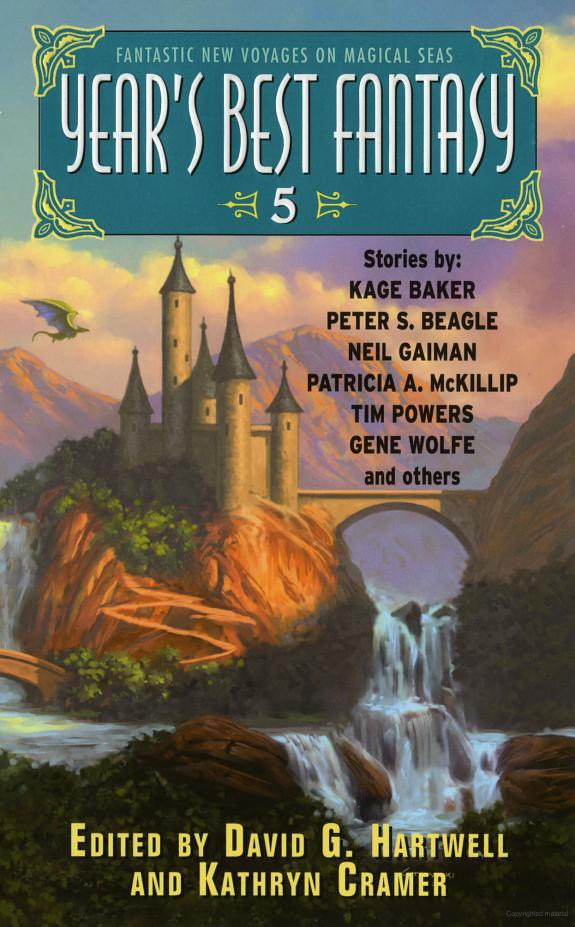
- The Dragons of Summer Gulch by Robert Reed
- Miss Emily Gray by Theodora Goss
- The Baum Plan for Financial Independence by John Kessel
- Lizzy Lou by Barbara Robson
- The End of the World as We Know It by Dale Bailey
- Leaving His Cares Behind Him by Kage Baker
- The Problem of Susan by Neil Gaiman
- Stella's Transformation by Kim Westwood
- Charlie the Purple Giraffe Was Acting Strangely by David D. Levine
- Pat Moore by Tim Powers
- Perpetua by Kit Reed
- Quarry by Peter S. Beagle
- Diva's Bones by John Meaney
- The Seventh Daughter by Bruce McAllister
- Life in Stone by Tim Pratt
- Many Voices by M. Rickert
- A Hint of Jasmine by Richard Parks
- Elvenbrood by Tanith Lee
- Beyond the River by Joel Lane
- Out of the Woods by Patricia A. McKillip
- The Man from Shemhaza by Steven Brust
- The Smile on the Face by Nalo Hopkinson
- Death's Door by Terry Bisson
- Golden City Far by Gene Wolfe
Publisher: Harper Voyager
Outsiders: 22 All-New Stories From the Edge (2005) edited by Nancy Holder & Nancy Kilpatrick
- "Freewheeling" by Charles de Lint
- "A Year and a Day in Old Theradane" by Scott Lynch
- "Caligo Lane" by Ellen Klages
- "Socks" by Delia Sherman
- "Painted Birds and Shivered Bones" by Kat Howard
- "The Goldfish Pond and Other Stories" by Neil Gaiman
- "One-Eyed Jack and the Suicide King" by Elizabeth Bear
- "Street Worm" by Nisi Shawl
- "A Water Matter" by Jay Lake
- "Last Call" by Jim Butcher
- "Bridle" by Caitlín R. Kiernan
- "The Last Triangle" by Jeffrey Ford
- "Working for the God of the Love of Money" by Kaaron Warren
- "Hello, Moto" by Nnedi Okorafor
- "The Spirit of the Thing: A Nightside Story" by Simon R. Green
- "A Night in Electric Squidland" by Sarah Monette
- "Speechless in Seattle" by Lisa Silvverthorne
- "Palimpsest" by Catherynne M. Valente
- "Ash" by John Shirley
- "In Our Block" by R. A. Lafferty
Publisher: ROC
By Blood We Live (2009) edited by John Joseph Adams
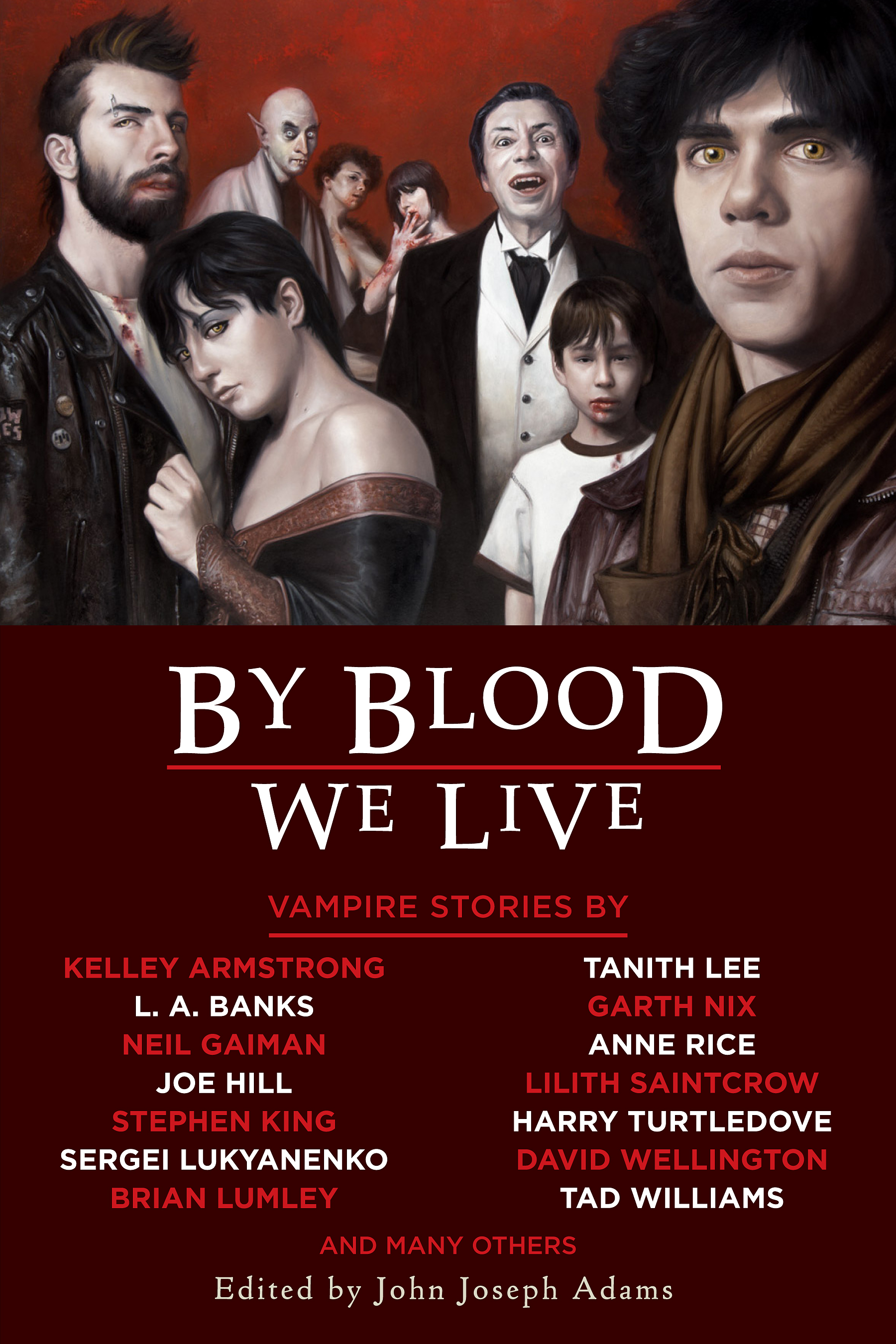
- Snow, Glass, Apples by Neil Gaiman
- The Master of Rampling Gate by Anne Rice
- Under St. Peter's by Harry Turtledove
- Child of an Ancient City by Tad Williams
- Lifeblood by Michael A. Burstein
- Endless Night by Barbara Roden
- Infestation by Garth Nix
- Life is the Teacher by Carrie Vaughn
- The Vechi Barbat by Nancy Kilpatrick
- The Beautiful, The Damned by Kristine Kathryn Rusch
- Pinecones by David Wellington
- Do Not Hasten to Bid Me Adieu by Norman Partridge
- Foxtrot at High Noon by Sergei Lukyanenko
- This is Now by Michael Marshall Smith
- Blood Gothic by Nancy Holder
- Mama Gone by Jane Yolen
- Abraham's Boys by Joe Hill
- Nunc Dimittis by Tanith Lee
- Hunger by Gabriela Lee
- Ode to Edvard Munch by Caitlín R. Kiernan
- Finders Keepers by L.A. Banks
- After the Stone Age by Brian Stableford
- Much at Stake by Kevin J. Anderson
- House of the Rising Sun by Elizabeth Bear
- A Standup Dame by Lilith Saintcrow
- Twilight by Kelley Armstrong
- In Darkness, Angels by Eric Van Lustbader
- Sunrise on Running Water by Barbara Hambly
- Hit by Bruce McAllister
- Undead Again by Ken MacLeod
- Peking Man by Robert J. Sawyer
- Necros by Brian Lumley
- Exsanguinations by Catherynne M. Valente
- Lucy in Her Splendor by Charles Coleman Finlay
- The Wide, Carnivorous Sky by John Langan
- One for the Road by Stephen King
Publisher: Night Shade Books
The Secret History of Fantasy (2010) edited by Peter S. Beagle

This is an interesting collection of short stories, by some very good authors. I can't say all the stories were to my taste, but they were all very good.
- Ancestor Money by Maureen F. McHugh
- Scarecrow by Gregory Maguire
- Lady of the Skulls by Patricia A. McKillip
- We Are Norsemen by T.C. Boyle
- The Barnum Museum by Steven Millhauser
- Mrs. Todd's Shortcut by Stephen King
- Bears Discover Fire by Terry Bison
- Bones by Francesca Lia Block
- Snow, Glass, Apples by Neil Gaiman
- Fruit and Words by Aimee Bender
- The Empire of Ice Cream by Jeffery Ford
- The Edge of the World by Michael Swanwick
- Super Goat Man by Jonathan Lethem
- John Uskglass and the Cumbrian Charcoal Burner by Susanna Clarke
- The Book of Martha by Octavia E. Butler
- THe Vita Aeterna Mirror Company by Yann Martel
- Sleight of Hand by Peter S. Beagle
- Mythago Wood by Robert Holdstock
- 26 Monkeys, Also the Abyss by Kij Johnson
Francesca Lia Block's story "Bones" was yet another unsettling story. Bluebeard and something else entirely. And it was followed by the even more unsettling "Snow, Glass, Apples" which is one Neil Gaiman story I have never liked–it freaks me out too much.
All in all, an excellent collection of stories, albeit one I don't recommend reading when you're depressed.
Publisher: Tachyon Publications
Rating: 8/10
The Way of the Wizard (2010) edited by John Joseph Adams
I love anthologies. They give me an escape in bite size pieces that won't keep me up past my bed time on a work night, and they also often a wonderful introduction to authors I have not read previously.
This anthology focuses upon wizards of all sorts, doing wizardly things, though not very many evil wizards.
- In the Lost Lands by George R.R. Martin
- Family Tree by David Barr Kirtley
- John Uskglass and the Cumbrian Charcoal Burner by Susanna Clarke
- Wizard's Apprentice by Delia Sherman
- The Sorcerer Minus by Jeffrey Ford
- Life So Dear or Peace So Sweet by C.C. Finlay
- Card Sharp by Rajan Khanna
- So Deep That the Bottom Could Not Be Seen by Genevieve Valentine
- The Go-Slow by Nnedi Okorafor
- Too Fatal a Poison by Krista Hoeppner Leahy
- Jamaica by Orson Scott Card
- The Sorcerer's Apprentice by Robert Silverberg
- The Secret of Calling Rabbits by Wendy N. Wagner
- The Wizards of Perfil by Kelly Link
- How to Sell the Ponti Bridge by Neil Gaiman
- The Magician and the Maid and Other Stories by Christie Yant
- Winter Solstice by Mike Resnick
- The Trader and the Slave by Cinda Williams Chima
- Cerile and the Journeyer by Adam-Troy Castro
- Counting the Shapes by Yoon Ha Lee
- Endgame by Lev Grossman
- Street Wizard by Simon R. Green
- Mommy Issues of the Dead by T.A. Pratt
- One-Click Banishment by Jeremiah Tolbert
- The Ereshkigal Working by Jonathan L. Howard
- Feeding the Feral Chidren by David Farland
- The Orange-Tree Sacrifice by Vylar Kaftan
- Love Is the Spell That Casts Out Fear by Desirina Boskovich
- El Regalo by Peter S. Beagle
- The Word of Unbinding by Ursula K. Le Guin
- The Thirteen Texts of Arthyria by John R. Fultz
- The Secret of the Blue Star by Marion Zimmer Bradley
"How to Sell the Ponti Bridge" by Neil Gaiman. I don't know why I'm so fond of story about rogues. I don't like them very much in real life (at least I don't like the ones I've met) but they're so fun to read about.
There were multiple stories I didn't care for, but on the whole, I found it a good and enjoyable collection. After all, I don't have to read the stories I don't like.
Published by Prime Books
Rating: 7/10
People of the Book: A Decade of Jewish Science Fiction & Fantasy (2010) edited by Peter S. Beagle and Shawn Wallace

- Burning Beard: The Dreams and Visions of Joseph ben Jacob, Lord Viceroy of Egypt by Rachel Pollack
- How the Little Rabbi Grew by Eliot Fintushel
- Geddarien by Rose Lemberg
- The Wings of Meister Wilhelm by Theodora Goss
- The Dybbuk in Love by Sonya Taaffe
- Fidelity: A Primer by Michael Blumlein
- Niels Bohr and the Sleeping Dane by Jonathon Sullivan
- The Tsar's Dragon by Jane Yolen & Adam Stemple
- Going East by Elana Gomel
- Dark Coffee, Bright Light and the Paradoxes ofOmnipotence by Ben Burgis
- Biographical Notes to "A Discourse on the Nature ofCausality, with Air-planes" by Ben Rosenbaum
- Alienation and Love in the Hebrew Alphabet by Lavie Tidhar
- The Problem of Susan by Neil Gaiman
- Uncle Chaim and Aunt Rifke and the Angel by Peter S. Beagle
- Eliyahu ha-Navi by Max Sparber
- Reuben by Tamar Yellin
- The Muldoon by Glen Hirshberg
- Semaphore by Alex Irvine
- Golems I Have Known, or, Why My Elder Son's Middle NameIs Napoleon: A Trickster's Memoir by Michael Chabon
- The History Within Us by Matthew Kressel
Publisher: Prime Books
Teeth: Vampire Tales (2011) edited by Ellen Datlow & Terri Windling
This is an Ellen Datlow and Terri Windling anthology, so as always, there are fascinating bits of folklore.
Rice, not garlic, was the most effective means of keeping Chinese vampires at bay, for they had a strange compulsion to count. Throwing rice at the ghost compelled it to stop; it would not move again until each grain was counted.
- "Things to Know About Being Dead" by Genevieve Valentine
- "All Smiles" by Steve Berman
- "Gap Year" by Christopher Barzak
- "Bloody Sunrise" by Neil Gaiman
- "Flying" by Delia Sherman
- "Vampire Weather" by Garth Nix
- "Late Bloomer" by Suzy McKee Charnas
- "The List of Definite Endings" by Kaaron Warren
- "Best Friends Forever" by Cecil Castellucci
- "Sit the Dead" by Jeffrey Ford
- "Sunbleached" by Nathan Ballingrud
- "Baby" by Kathe Koja
- "In the Future When All's Well" by Catherynne M. Valente
- "Transition" by Melissa Marr
- "History" by Ellen Kushner
- "The Perfect Dinner Party" by Cassandra Clare & Holly Black
- "Slice of Life" by Lucius Shepard
- "My Generation" by Emma Bull
- "Why Light?" by Tanith Lee
"Bloody Sunrise" by Neil Gaiman is a poem, and I'm a heathen and just don't get poetry. (Apologies to all my friends who are poets.)
As expected, this was a very good anthology, and although I didn't like the horror or the poetry, that's a failing of mine, not the anthology.
Published by Harper Collins
Rating: 8/10
Happily Ever After (2011) edited by John Klima
Not sure how I missed this when I first came out, but this anthology is full of things I love: authors whose books I love, stories based on folk and fairy tales–lovely!
The only thing I didn't like, is I wish the anthology hadn't ended on such a dark and depressing story.
Mind you, the dark and depressing stories were good–very good–but these tales ran very true to the original stories, with a not insignificant amount of rape and incest and general horribleness. Just like the original tales.
- The Seven Stage a Comeback by Gregory Maguire
- And In Their Glad Rags by Genevieve Valentine
- The Sawing Boys by Howard Waldrop
- Bear It Away by Michael Cadnum
- Mr. Simonelli or the Fairy Widower by Susanna Clarke
- The Black Fairy's Curse by Karen Joy Fowler
- My Life As A Bird by Charles de Lint
- The Night Market by Holly Black
- The Rose in Twelve Petals by Theodora Goss
- The Red Path by Jim C. Hines
- Blood and Water by Alethea Kontis
- Hansel's Eyes by Garth Nix
- He Died That Day, In Thirty Years by Wil McCarthy
- Snow In Summer by Jane Yolen
- The Rose Garden by Michelle West
- The Little Magic Shop by Bruce Sterling
- Black Feather by K. Tempest Bradford
- Fifi's Tail by Alan Rodgers
- The Faery Handbag by Kelly Link
- Ashputtle by Peter Straub
- The Emperor's New (And Improved) Clothes by Leslie What
- Pinocchio's Diary by Robert J. Howe
- Little Red by Wendy Wheeler
- The Troll Bridge by Neil Gaiman
- The Price by Patricia Briggs
- Ailoura by Paul Di Filippo
- The Farmer's Cat by Jeff VanderMeer
- The Root of The Matter by Gregory Frost
- Like a Red, Red Rose by Susan Wade
- Chasing America by Josh Rountree
- Stalking Beans by Nancy Kress
- Big Hair by Esther Friesner
- The Return of the Dark Children by Robert Coover
Please note, as previously mentioned, the stories have rape and incest and lots and lots of sex in addition to evil stepmothers and other such killers.
There were also a fair number of very dark and very depressing tales that were very good, but that I didn't enjoy at all.
Published by Night Shade Books
Rating: 8/10
Under My Hat: Tales from the Cauldron (2012) edited by Jonathan Strahan
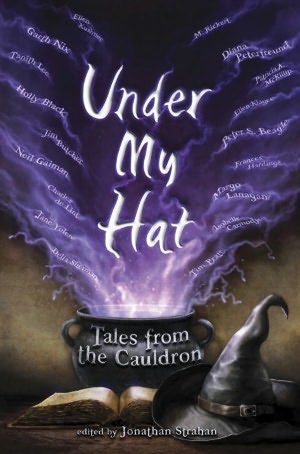
This is a lovely YA anthology, with some amazing stories by some of my favorite authors. I didn't love all the stories, but none of them were bad. The theme is young witches coming of age, but the stories are far greater than that.
- Stray Magic by Diana Peterfreund
- Payment Due by Frances Hardinge
- A Handful of Ashes by Garth Nix
- Little Gods by Holly Black
- Barrio Girls by Charles de Lint
- Felidis by Tanith Lee
- Witch Work by Neil Gaiman (poem)
- The Education of a Witch by Ellen Klages
- The Threefold World by Ellen Kushner
- The Witch in the Wood by Delia Sherman
- Which Witch by Patricia A. McKillip
- The Carved Forest by Tim Pratt
- Burning Castles by M. Rickert
- The Stone Witch by Isobelle Carmody
- Andersen's Witch by Jane Yolen
- B Is for Bigfoot by Jim Butcher
- Great-Grandmother in the Cellar by Peter S. Beagle
- Crow and Caper, Caper and Crow by Margo Lanagan
I'm sorry. As much as I love Neil Gaiman, that doesn't help me enjoy poetry. "Witch Work" was wasted on me.
Published by Random House
Rating: 9/10
Weird Detectives: Recent Investigations (2013) edited by Paula Guran
This is a collection of short stories previously published elsewhere, so I'd already read several of these stories. But there were several I had not, and several of the ones I'd read before were well worth reading again.
This book has been sitting around for awhile, waiting to be read, primarily because I got it in trade paperback, and it's huge and heavy–just the kind of book I hate reading. Too heavy and too bulky for comfortable reading. But the stories drew me in and didn't let me go. (Though the book itself was why I lacked patience for stories I'd recently read or didn't catch my interest immediately.)
- "The Key" by Ilsa J. Blick
- "The Nightside, Needless to Say" by Simon R. Green
- "The Adakian Eagle" by Bradley Denton
- "Love Hurts" by Jim Butcher
- "The Case of Death and Honey" by Neil Gaiman
- "Cryptic Coloration" by Elizabeth Bear
- "The Necromancer's Apprentice" by Lillian Stewart Carl
- "The Case of the Stalking Shadow" by Joe R. Lansdale
- "Hecate's Golden Eye" by P.N. Elrod
- "Defining Shadows" by Carrie Vaughn
- "Mortal Bait" by Richard Bowes
- "Star of David" by Patricia Briggs
- "Imposters" by Sarah Monette
- "Deal Breaker" by Justin Gustainis
- "Swing Shift" by Dana Cameron
- "The Beast of Glamis" by William Meikle
- "Signatures of the Dead" by Faith Hunter
- "Like a Part of the Family" by Jonathan Maberry
- "Fox Tails" by Richard Parks
- "Death by Dahlia" by Charlaine Harris
- "Sherlock Holmes and the Diving Bell" by Simon Clark
- "See Me" by Tanya Huff
- "The Maltese Unicorn" by Caitlín R. Kiernan
Initially, I was just going to flip through and read stories by authors I love, but then I ended up just reading straight through. Having no patience, if I story didn't immediately grab hold, I didn't finish it, and if I hadn't thoroughly enjoyed it the first time (or had read the story very recently), I didn't give it a second read.
"The Case of Death and Honey" by Neil Gaiman is the kind of story I generally dislike–a Sherlock Holmes story. But, it was Neil Gaiman, so I read it. I'm not going to change my mind about modern writers taking the reigns of Holmes and Watson, but this one wasn't too bad.
Published by Prime Books
Rating: 8/10
Street Magicks (2016) edited by Paula Guran
I believe it took me less than a year to finish this anthology. Hopefully this is a new trend for me.
- "Freewheeling" by Charles de Lint
- "A Year and a Day in Old Theradane" by Scott Lynch
- "Caligo Lane" by Ellen Klages
- "Socks" by Delia Sherman
- "Painted Birds and Shivered Bones" by Kat Howard
- "The Goldfish Pond and Other Stories" by Neil Gaiman
- "One-Eyed Jack and the Suicide King" by Elizabeth Bear
- "Street Worm" by Nisi Shawl
- "A Water Matter" by Jay Lake
- "Last Call" by Jim Butcher
- "Bridle" by Caitlín R. Kiernan
- "The Last Triangle" by Jeffrey Ford
- "Working for the God of the Love of Money" by Kaaron Warren
- "Hello, Moto" by Nnedi Okorafor
- "The Spirit of the Thing: A Nightside Story" by Simon R. Green
- "A Night in Electric Squidland" by Sarah Monette
- "Speechless in Seattle" by Lisa Silvverthorne
- "Palimpsest" by Catherynne M. Valente
- "Ash" by John Shirley
- "In Our Block" by R. A. Lafferty
"The Goldfish Pond and Other Stories" by Neil Gaiman is… well… it's a Neil Gaiman story.
An interesting collection, although there were a lot of stories that were not for me.
Published by Prime Books
Rating: 7/10
Short Stories
The Monarch of the Glen (2004)
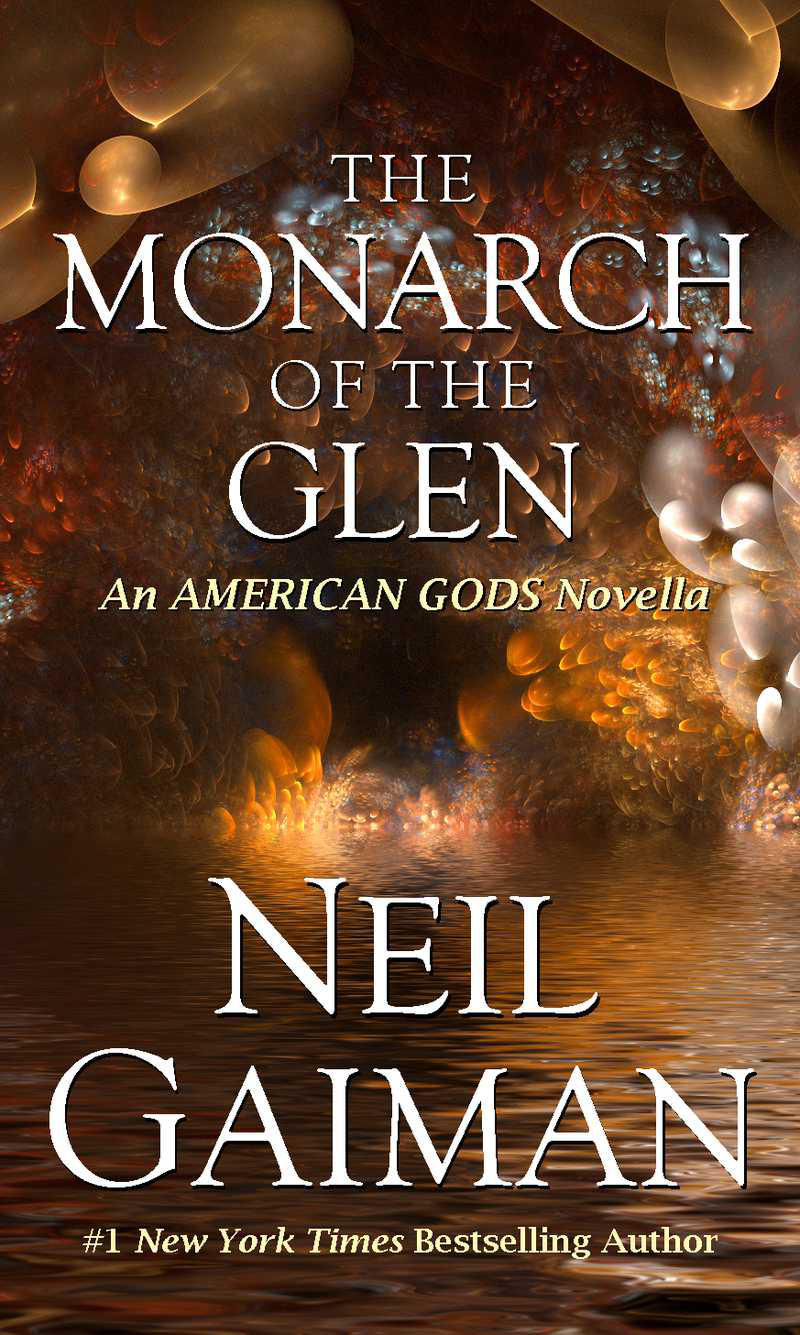 The Monarch of the Glen appeared first in Legends II (2004) edited by Robert Silverberg, and then in Gaiman's own short story collection Fragile Things.
The Monarch of the Glen appeared first in Legends II (2004) edited by Robert Silverberg, and then in Gaiman's own short story collection Fragile Things.
It is the story of Shadow, as he is wandering the world following the events in American Gods.
Shadow (and we learn his true name in this story) is wandering Scotland, when he is approached and asked to help provide security for an event happening in a local castle.
And that's about as much of a description as I can really give, because like everything Neil Gaiman writes, it's deep and wandering and full of myth and monsters.
It's also very good.
If you have not read American Gods you could read this as a peek into Gaiman's writing. But you're more likely to be wanting to read this if you have already read American Gods and want a peek at what happened to Shadow.
And really, if you're a Neil Gaiman fan, chances are you sought out this story years ago.
Rating: 8/10

